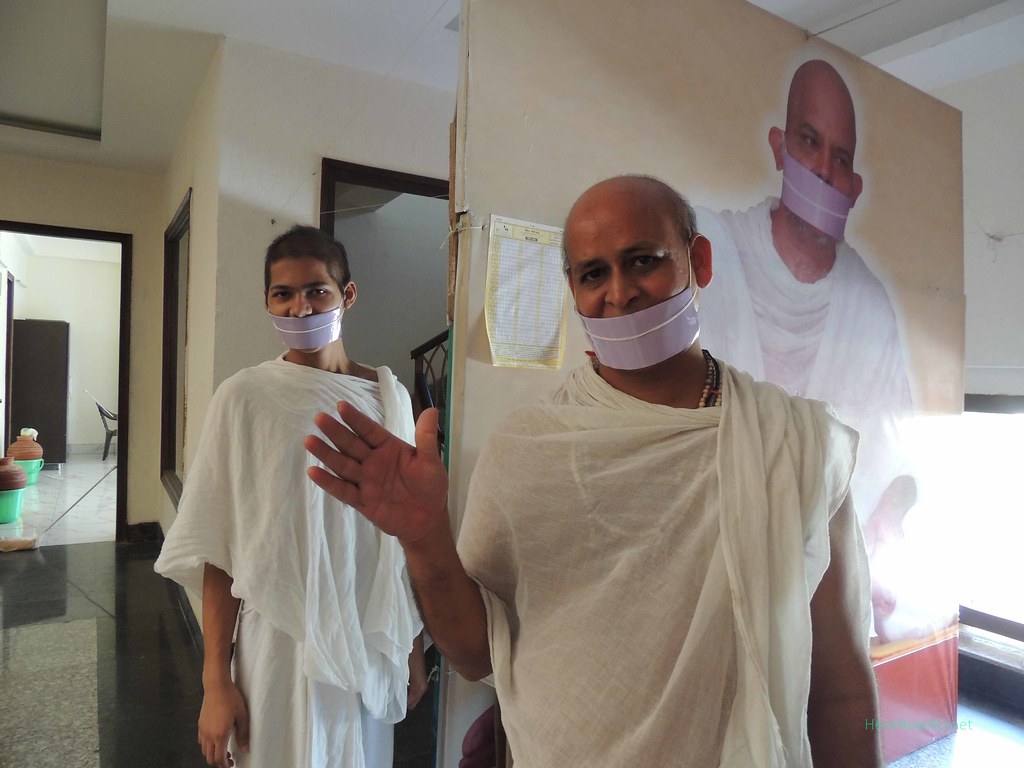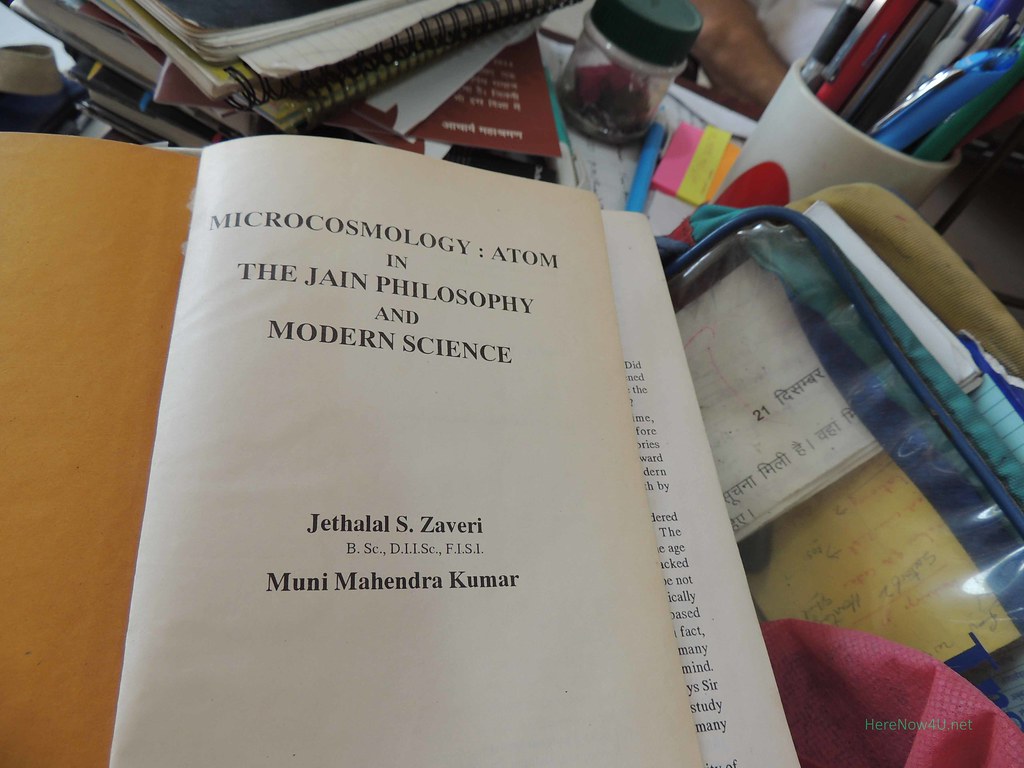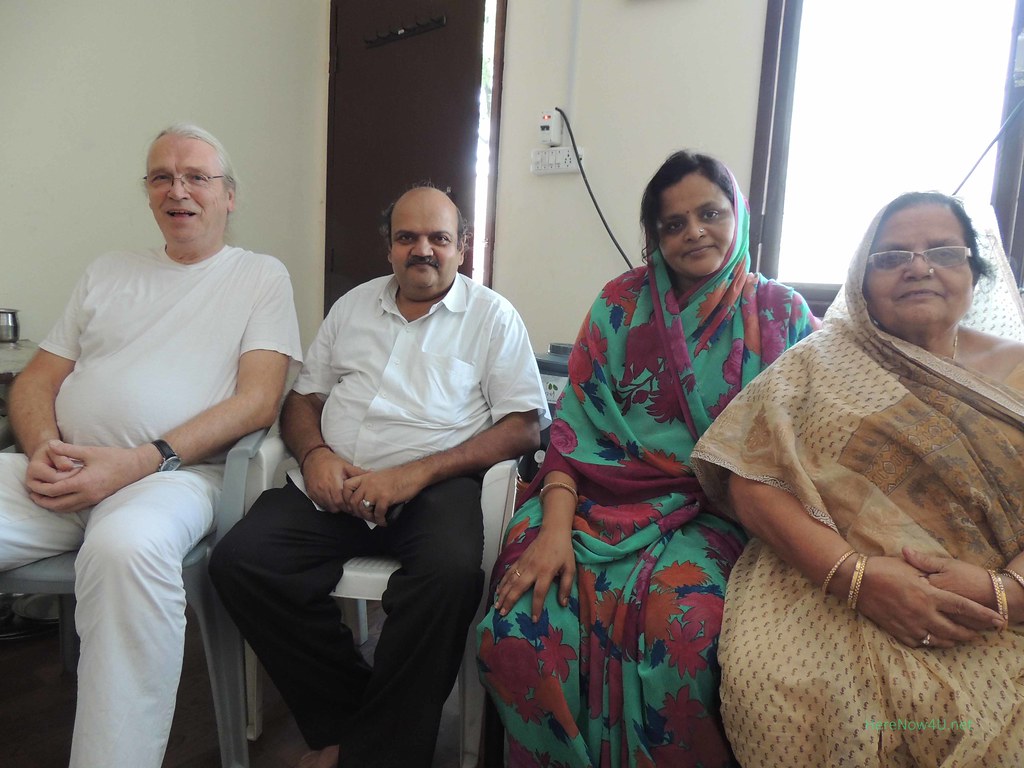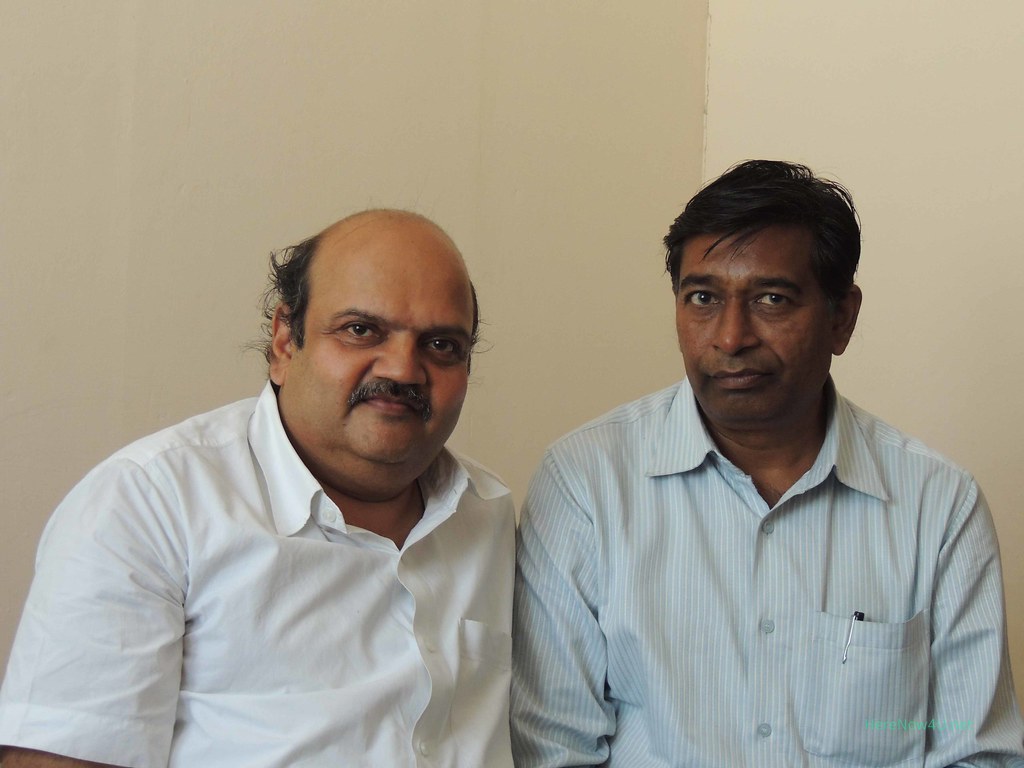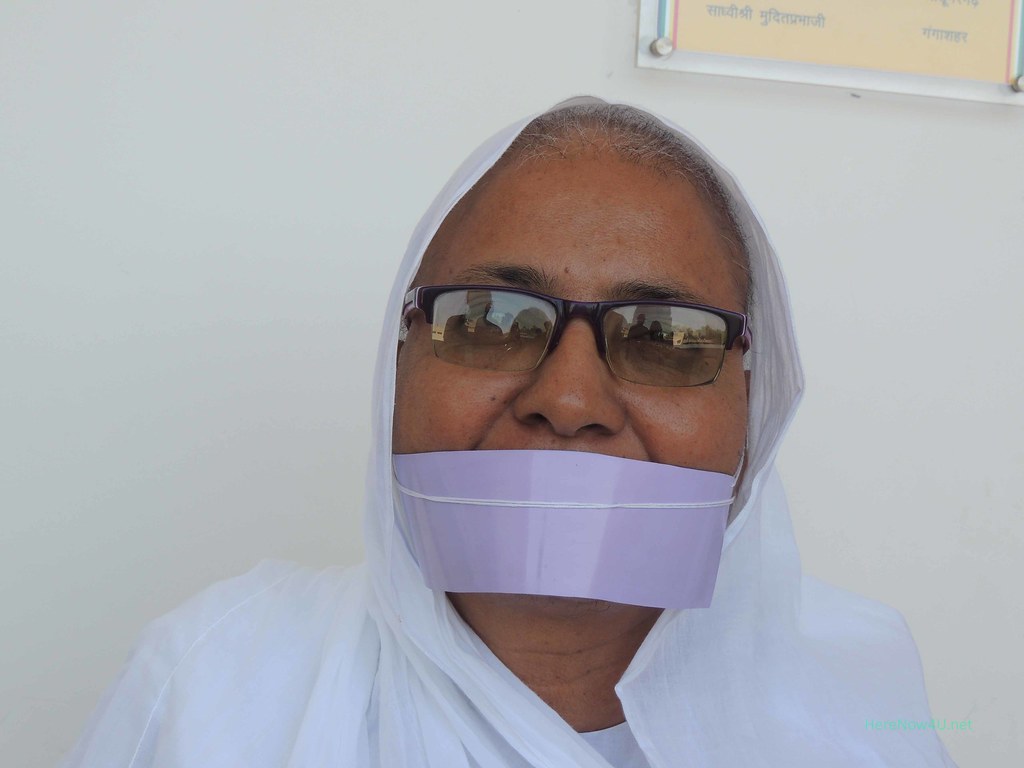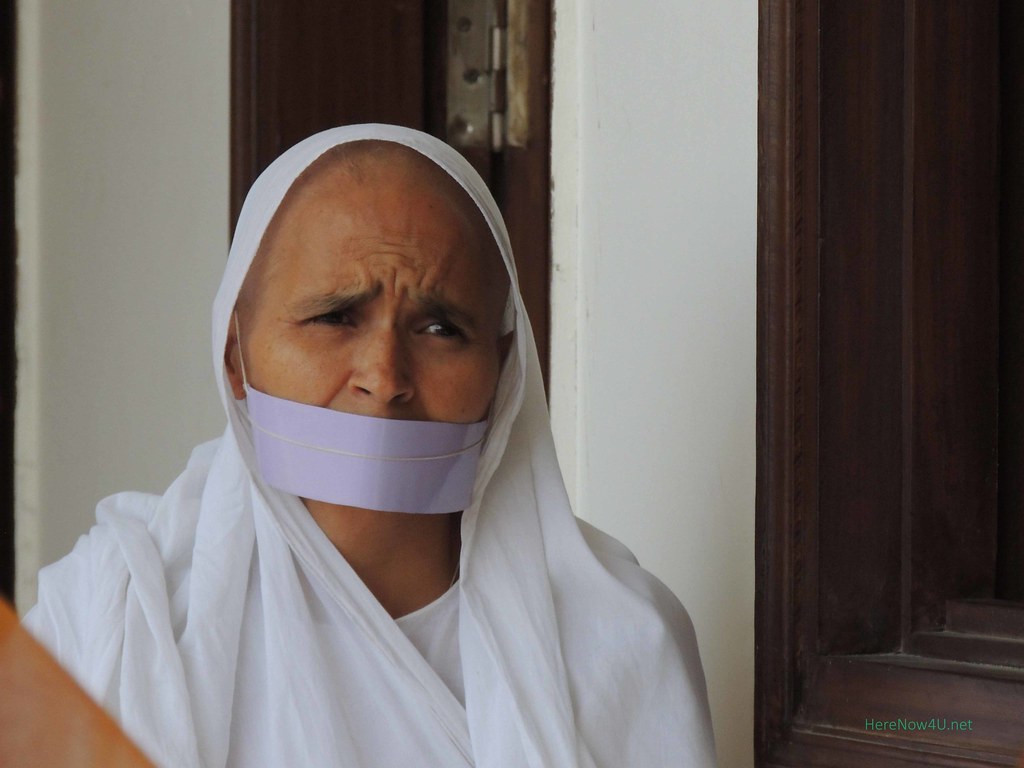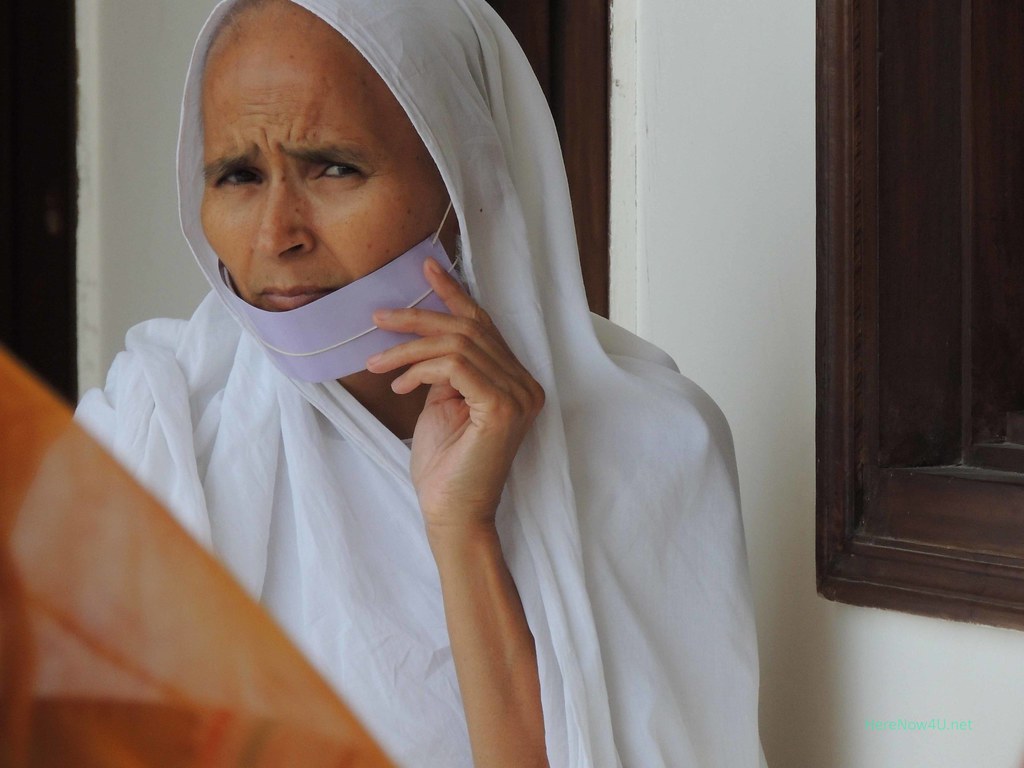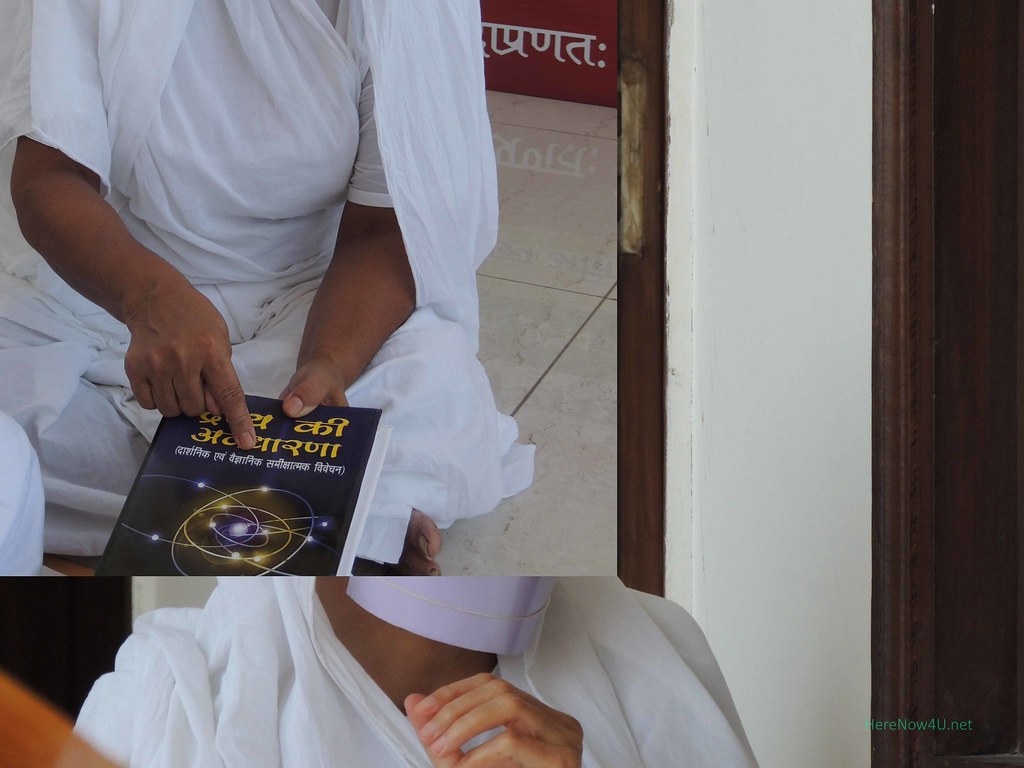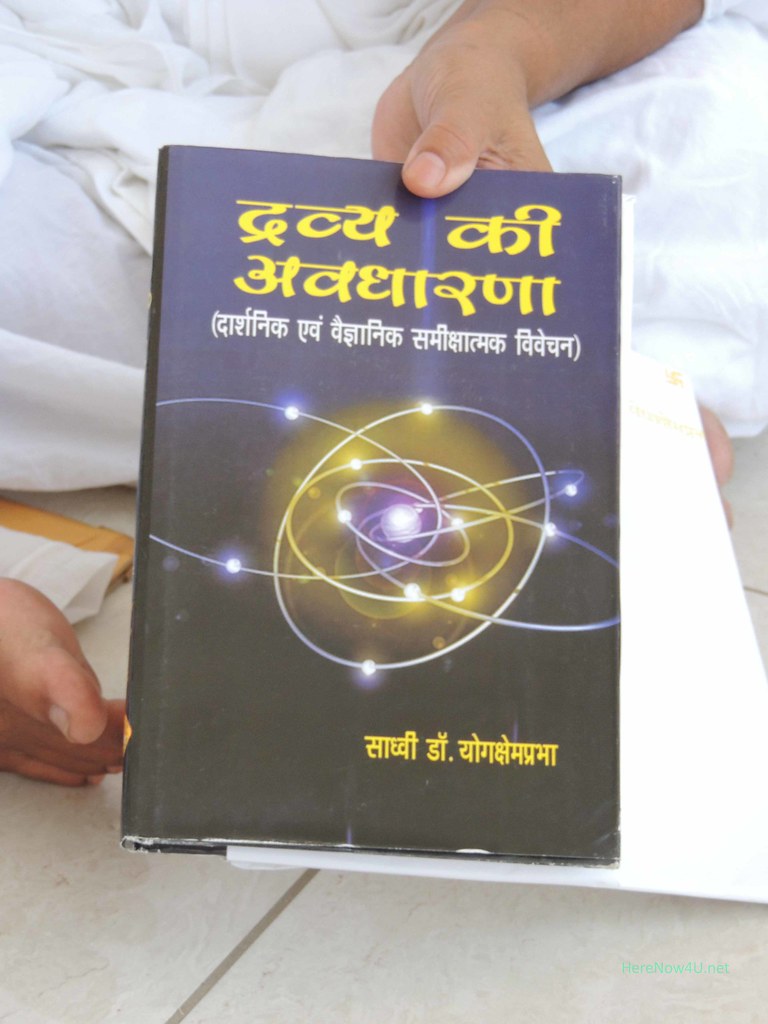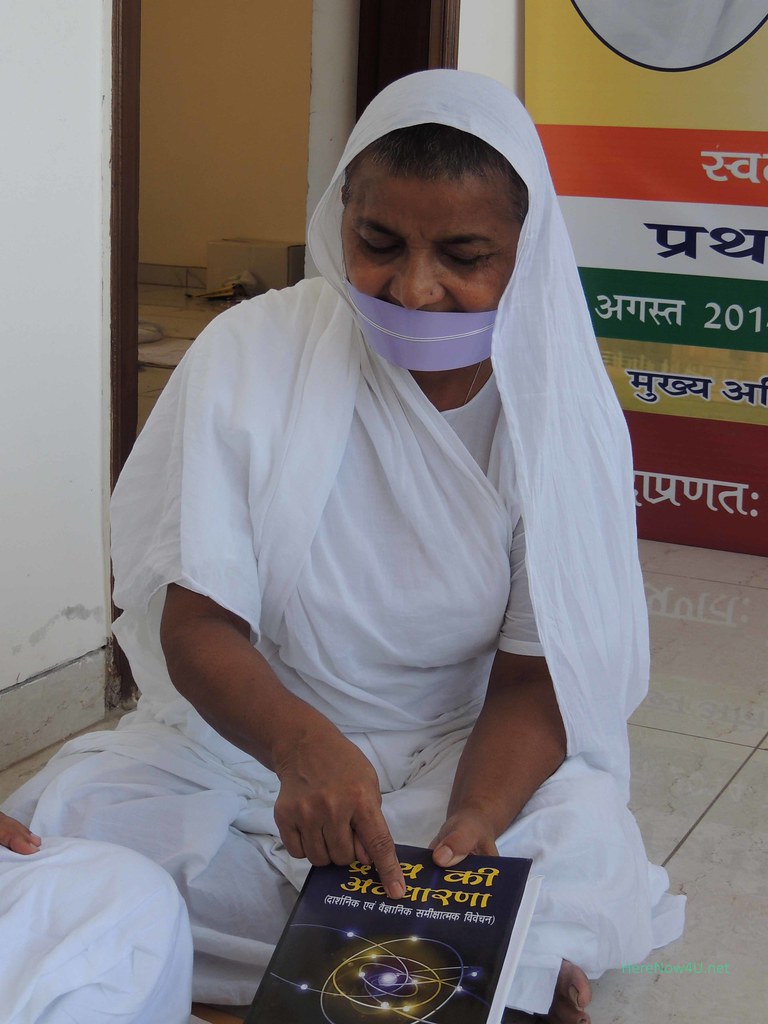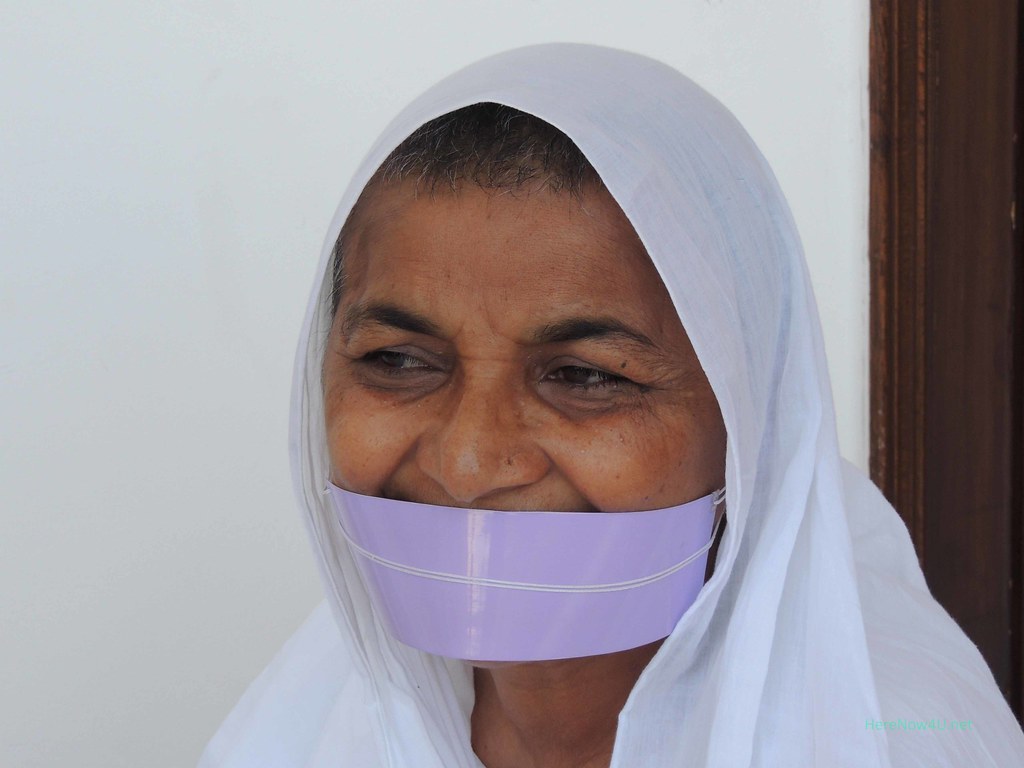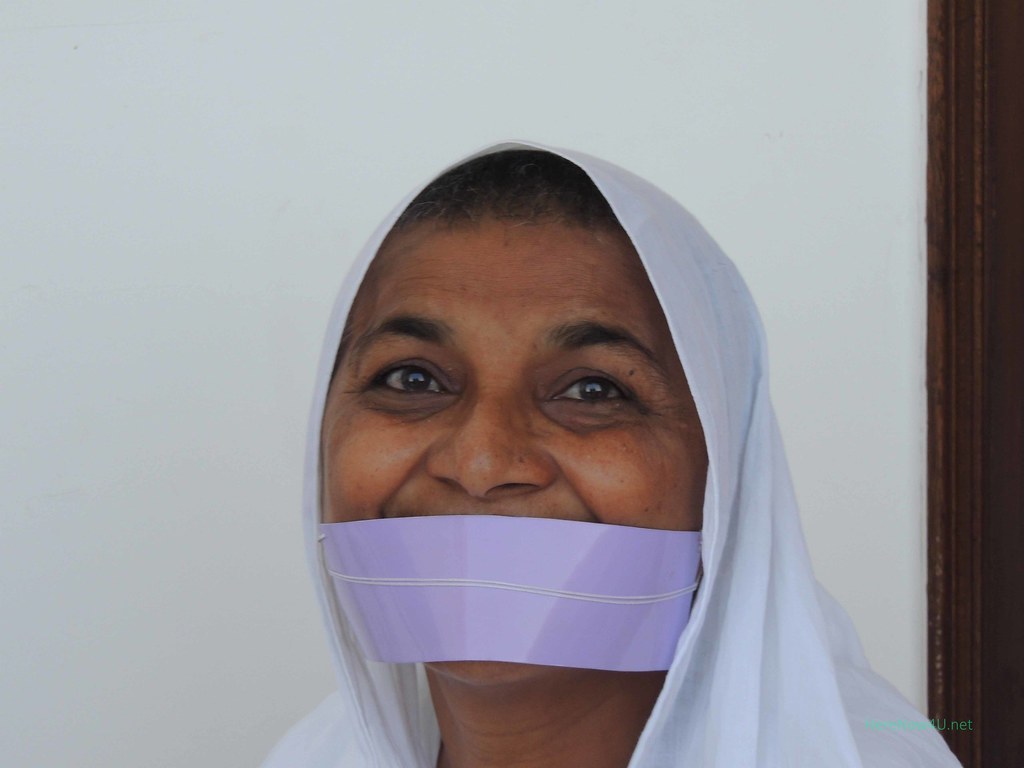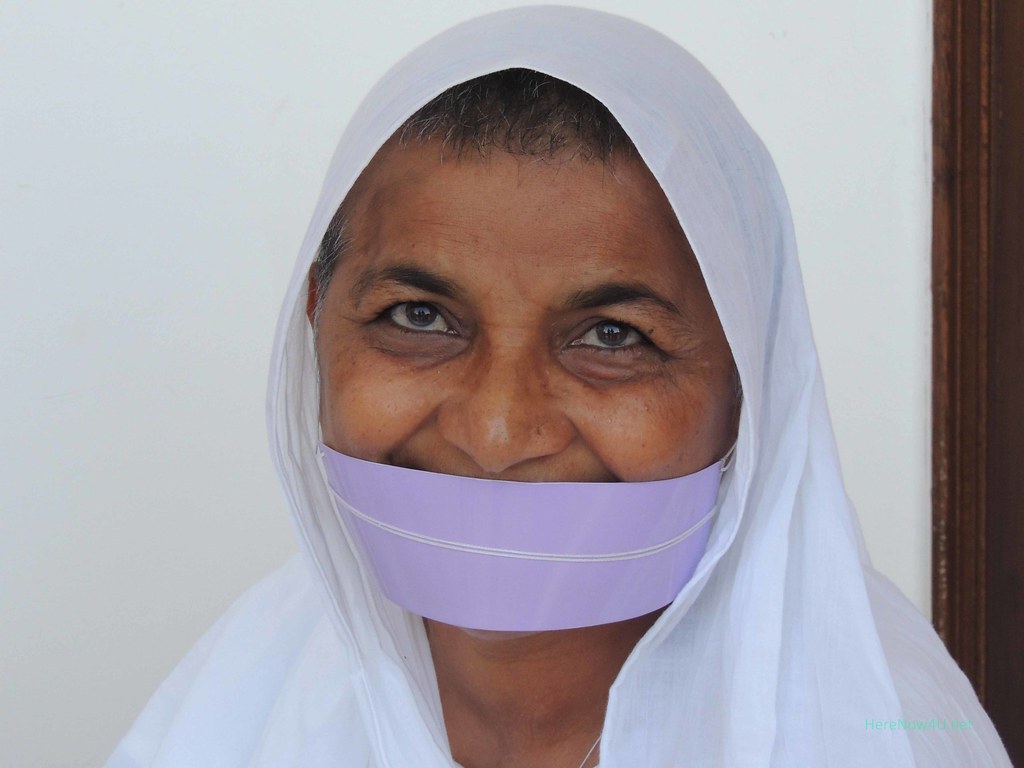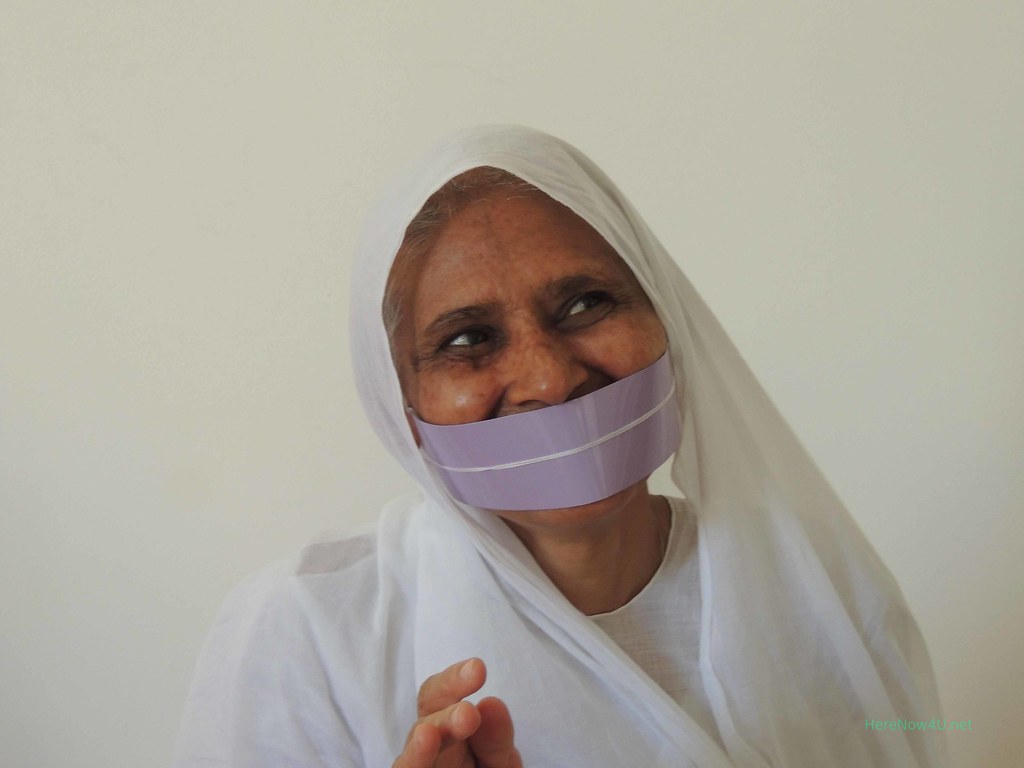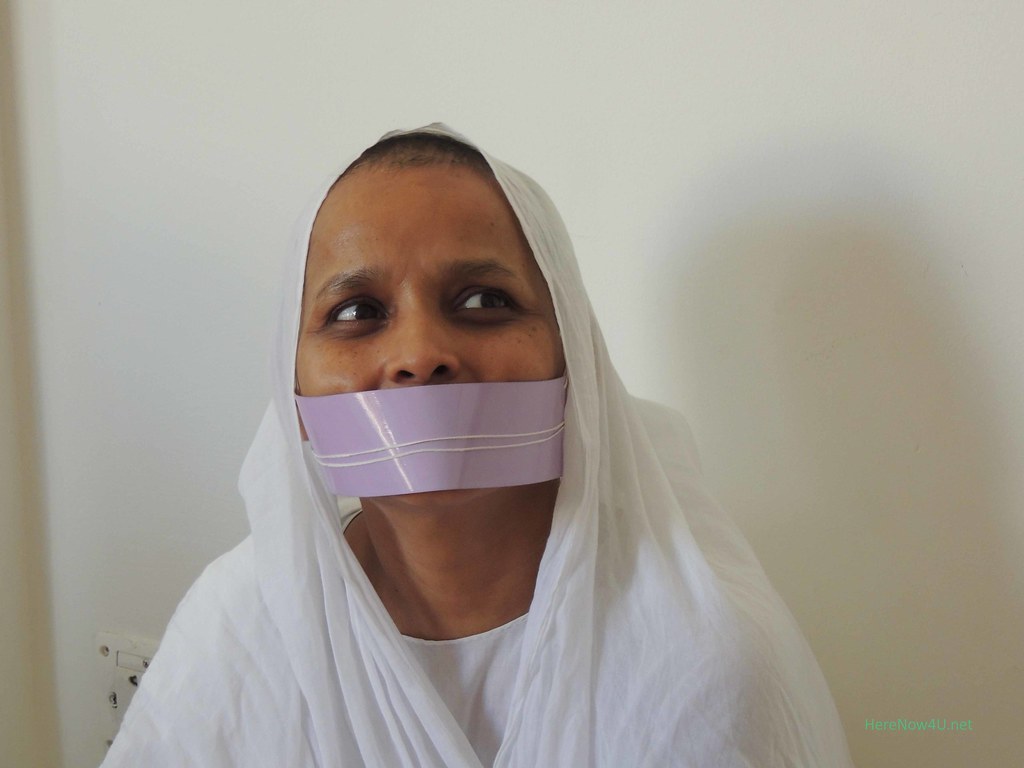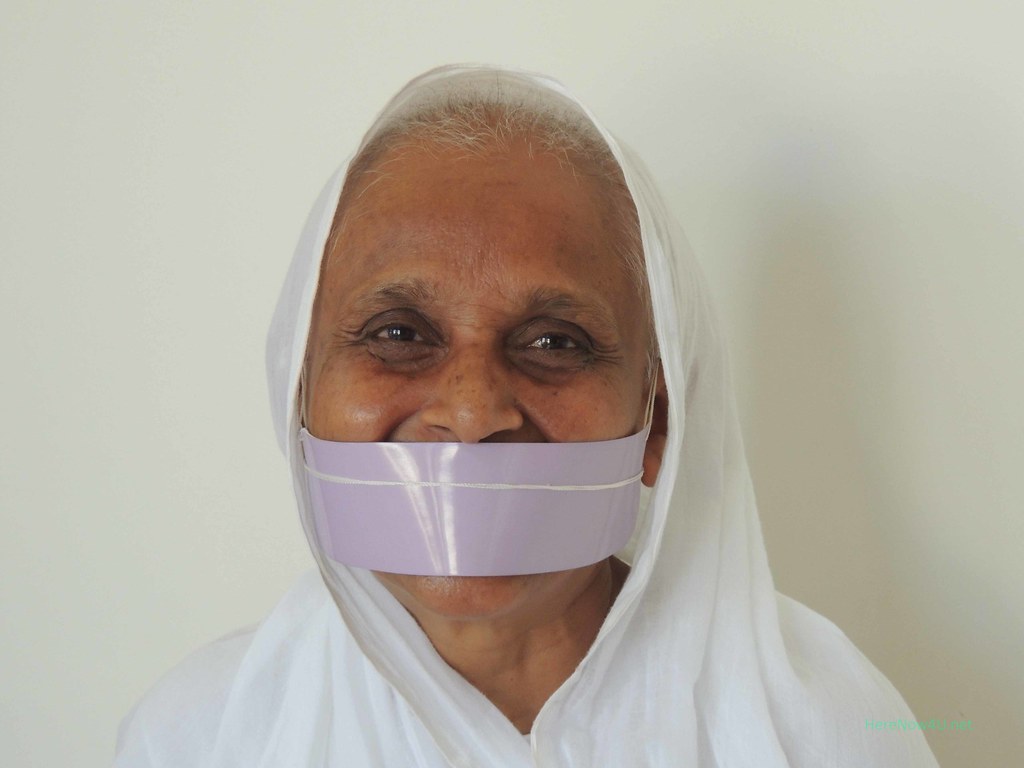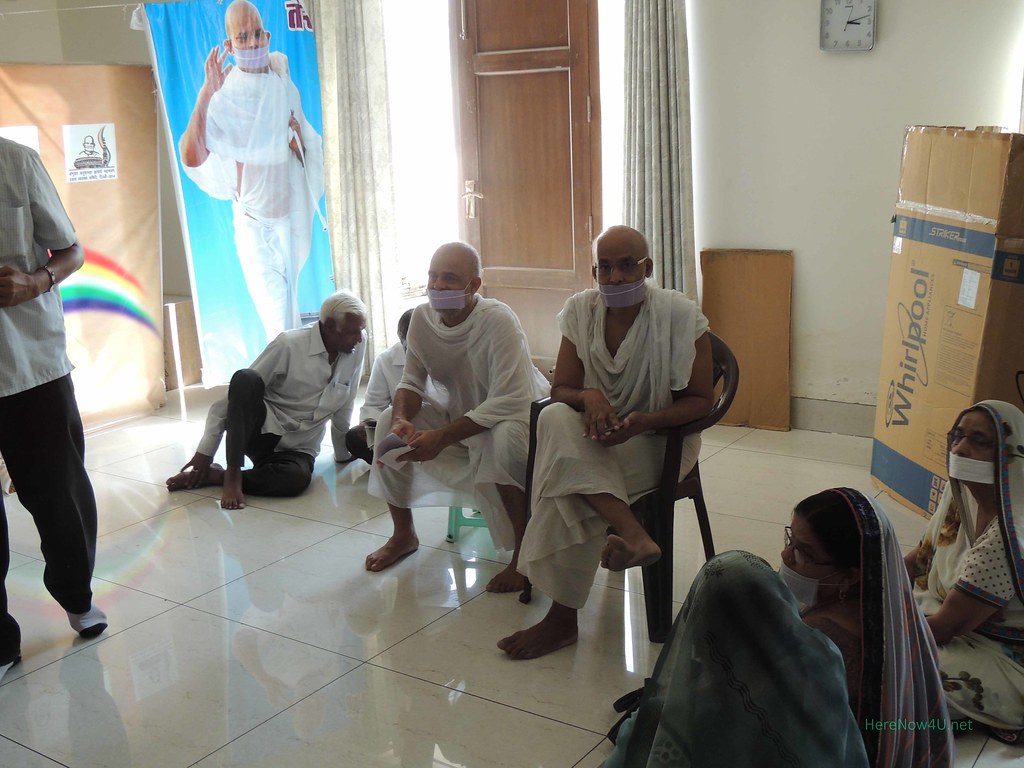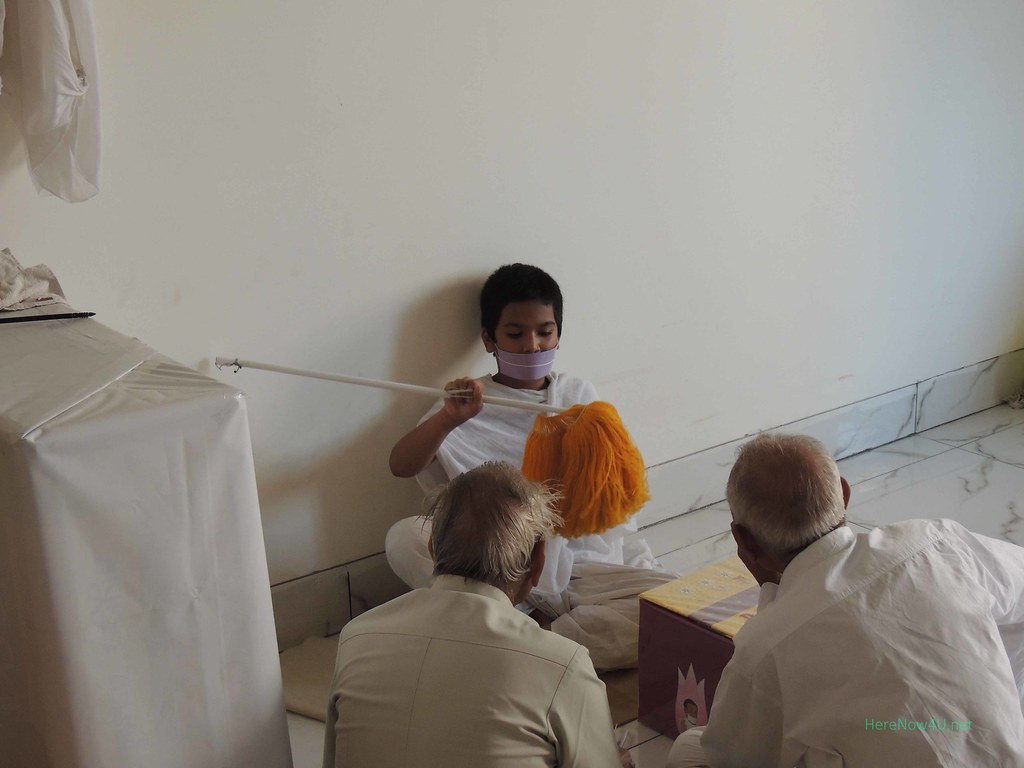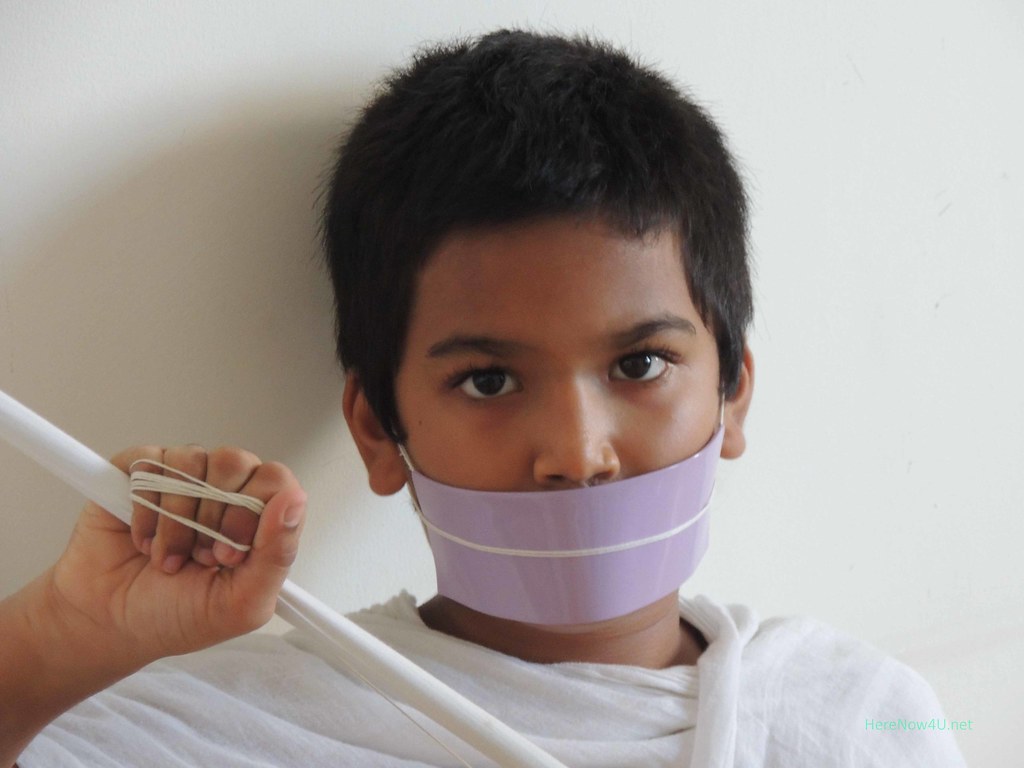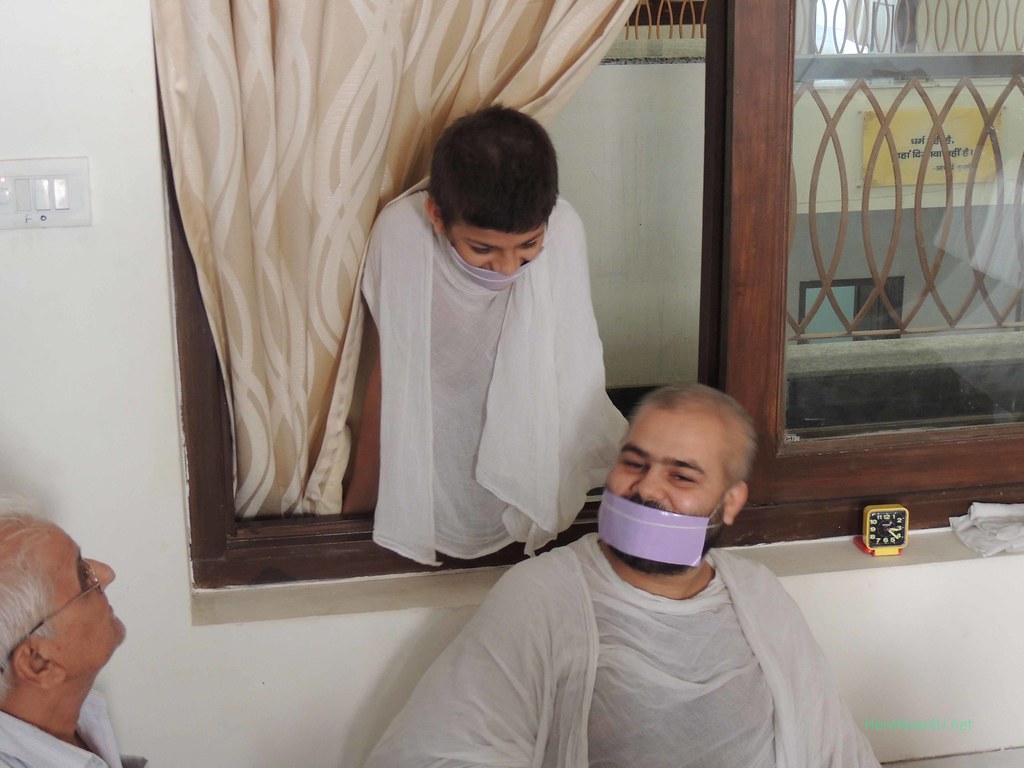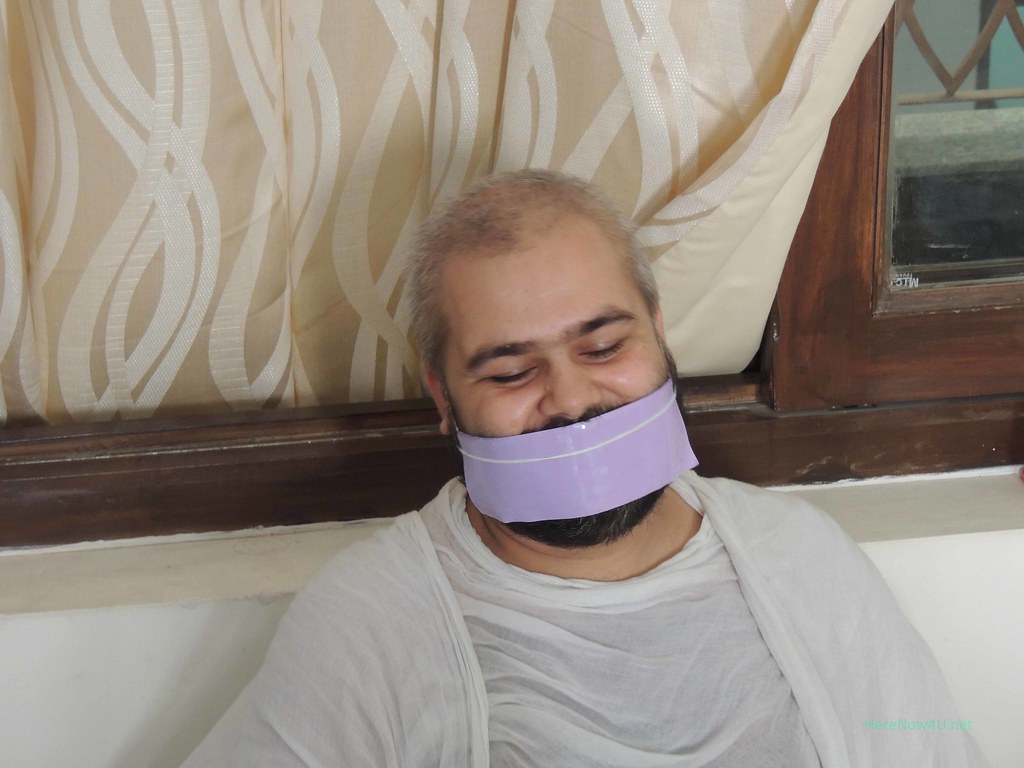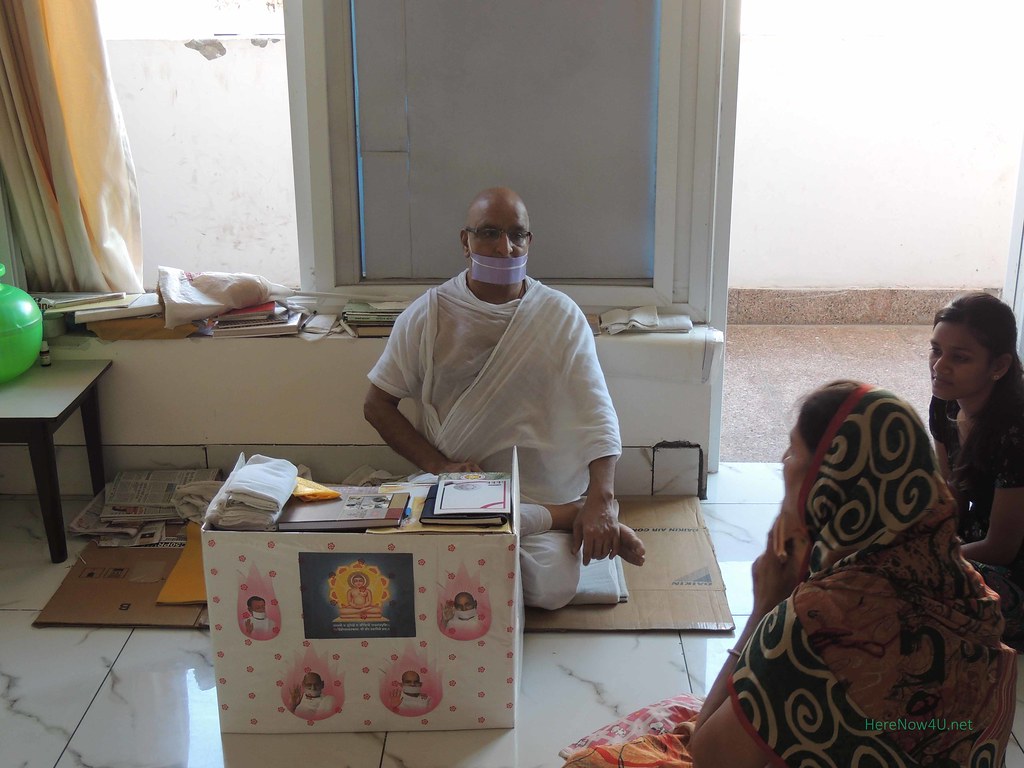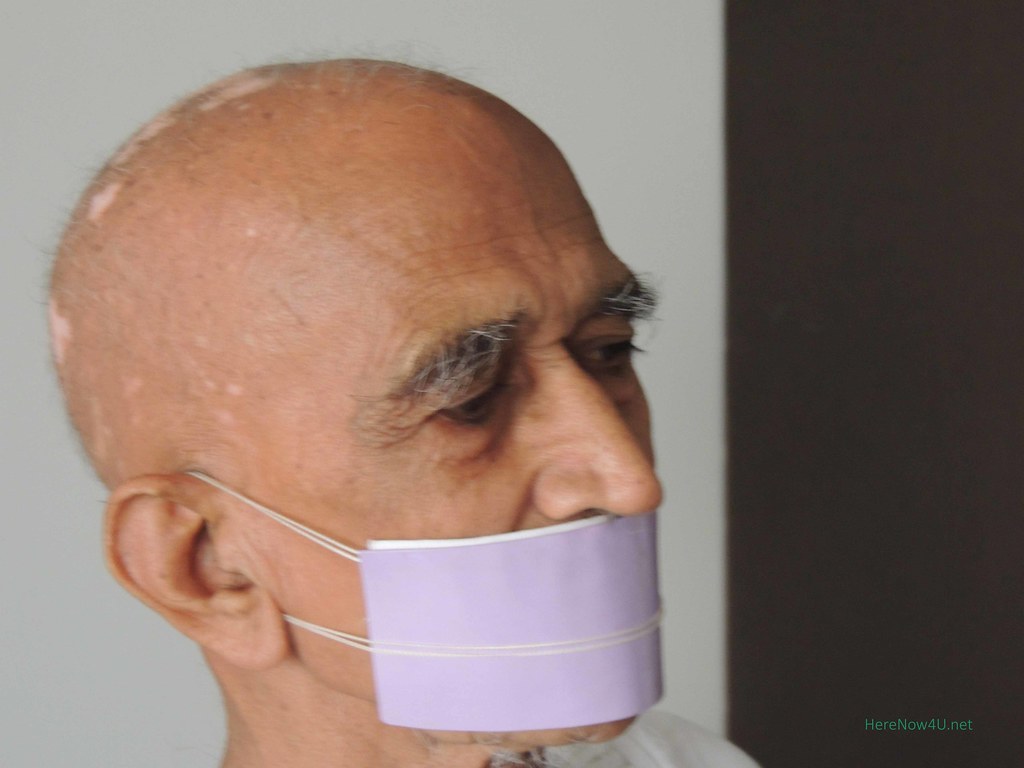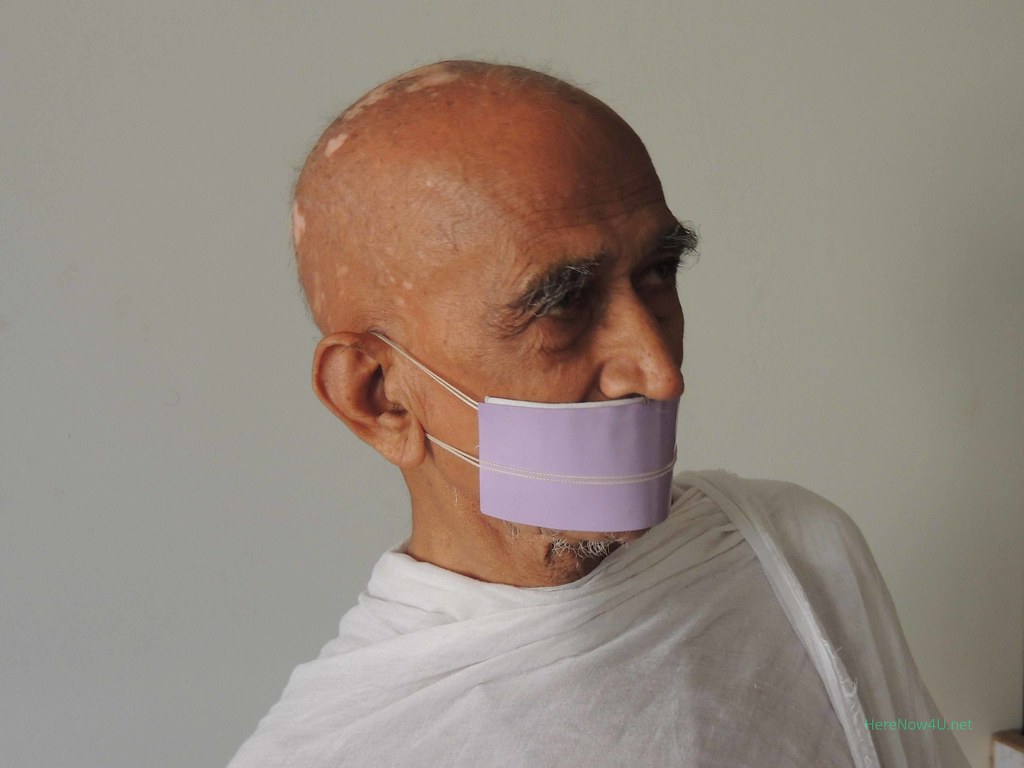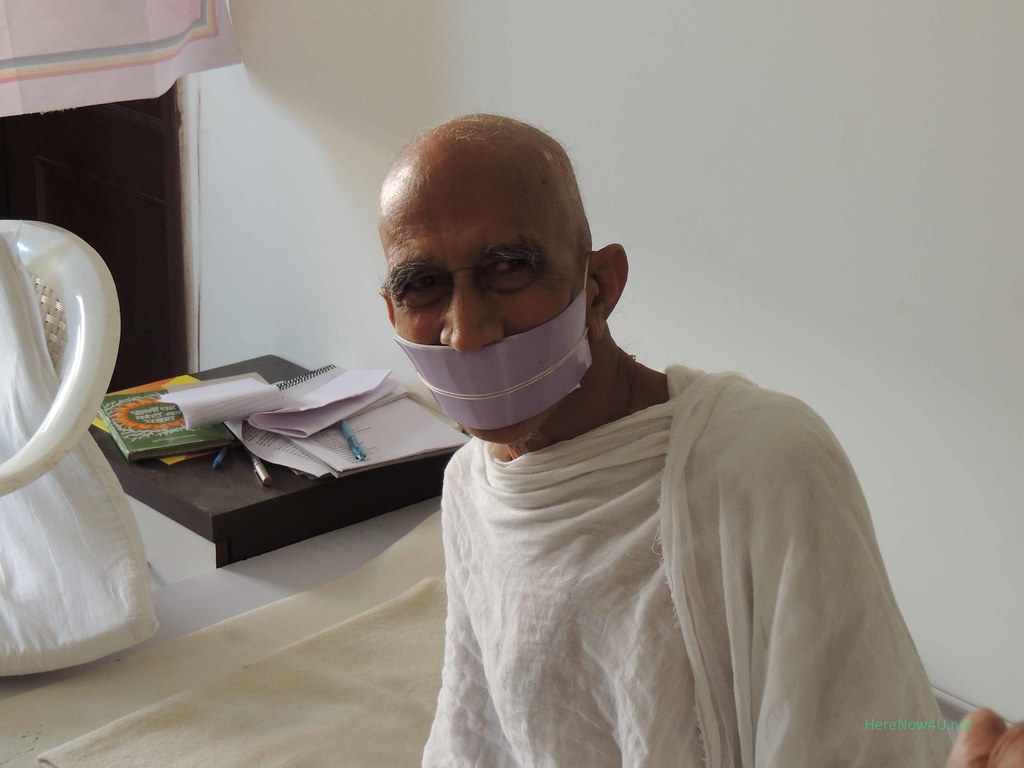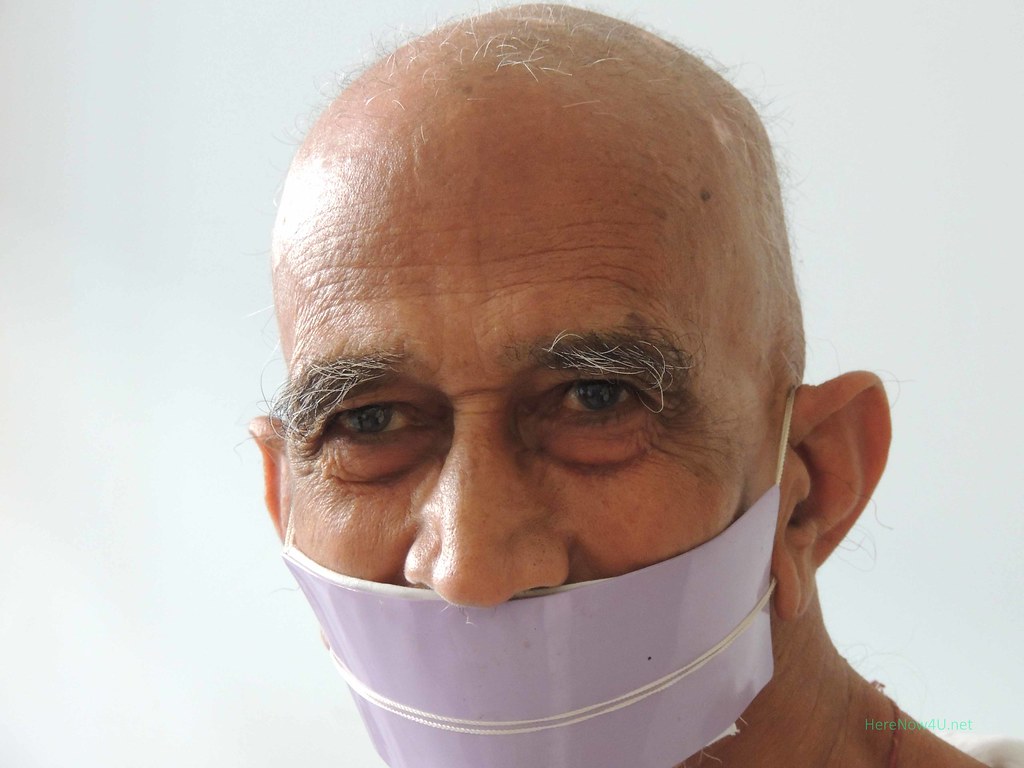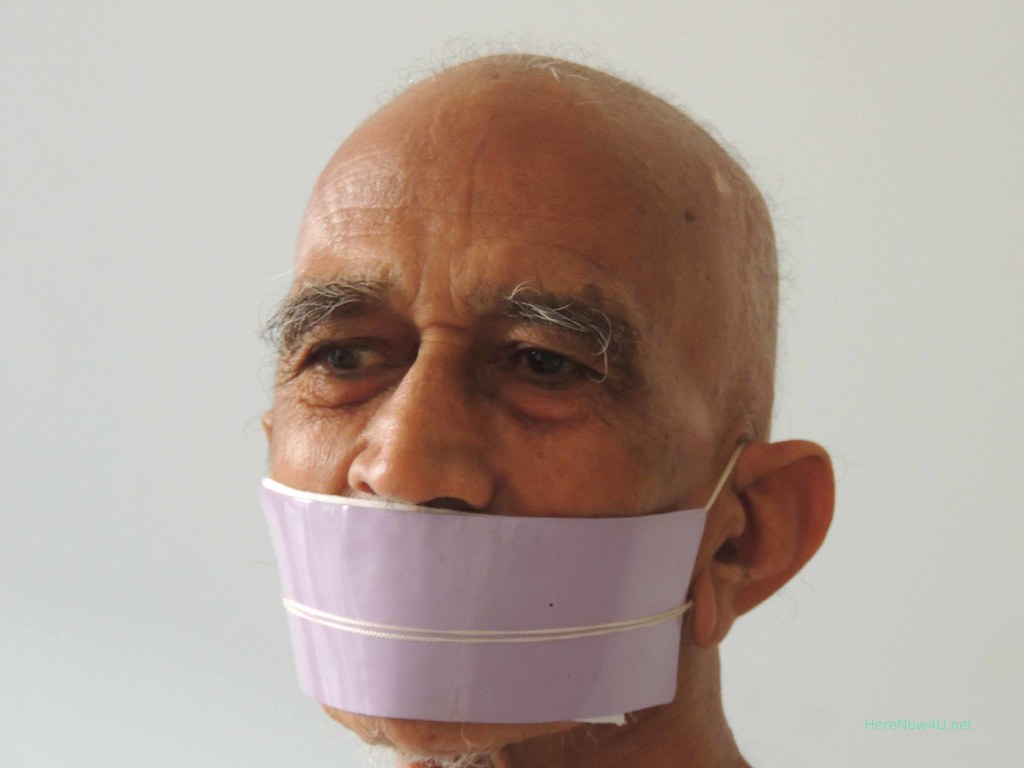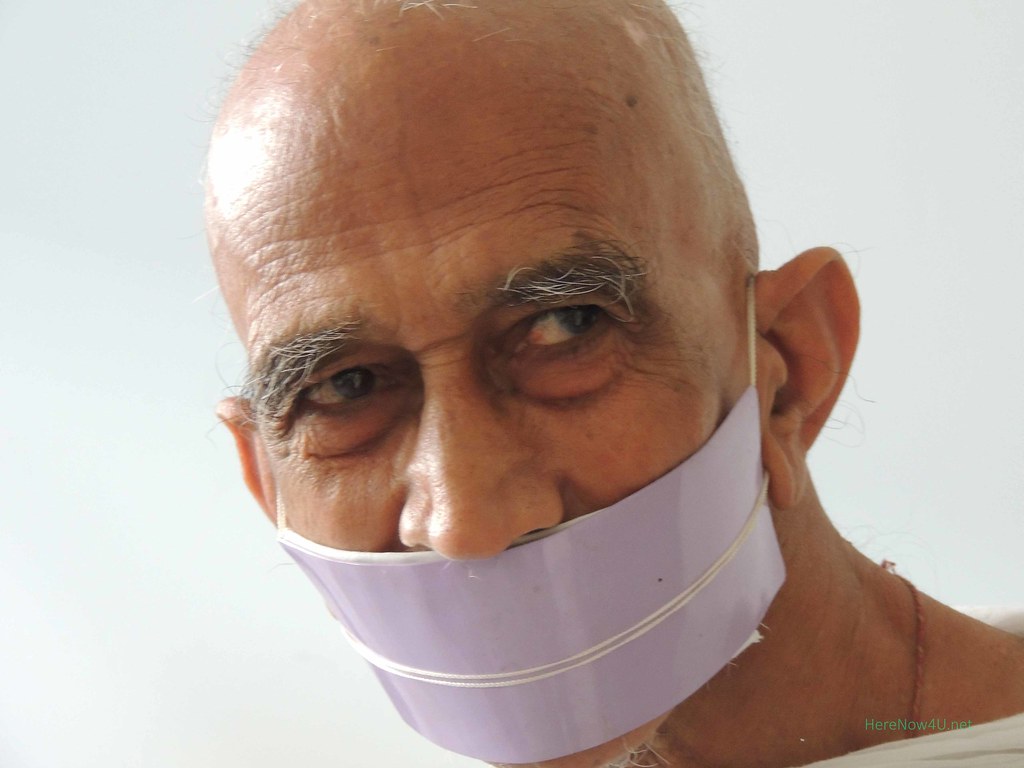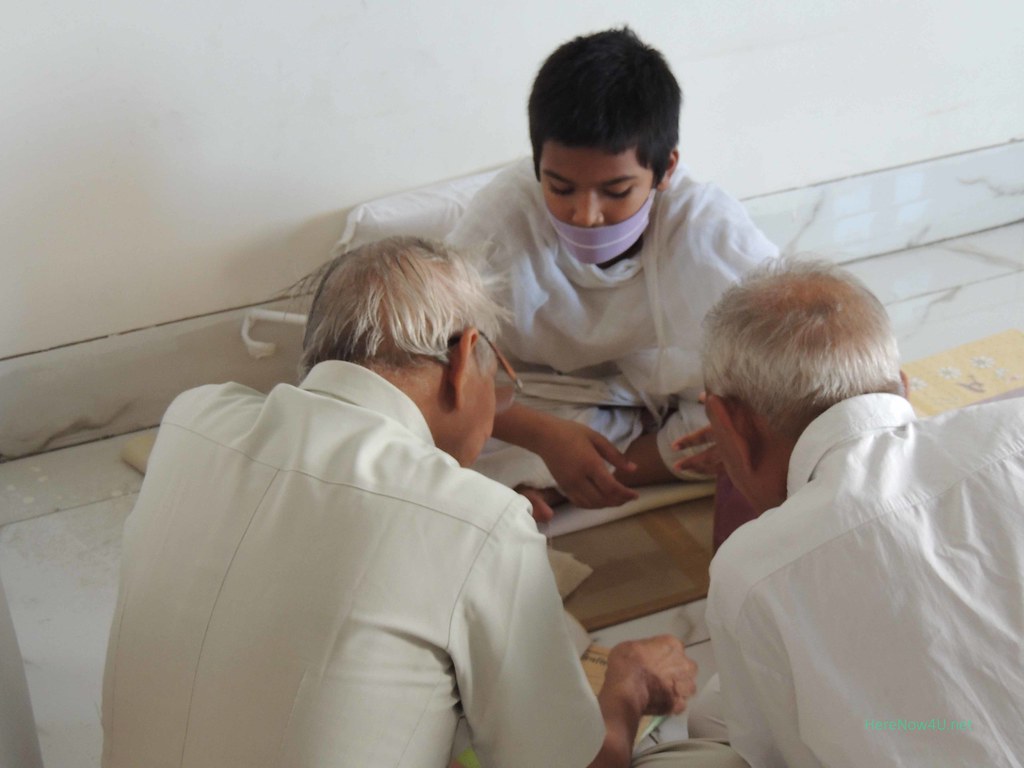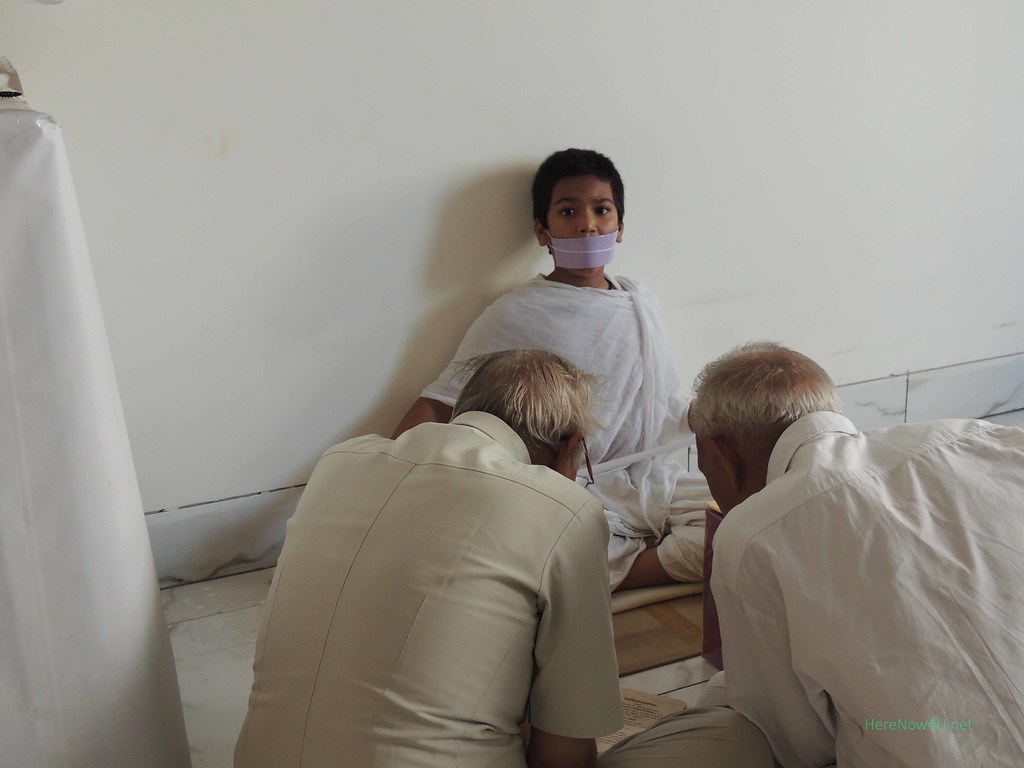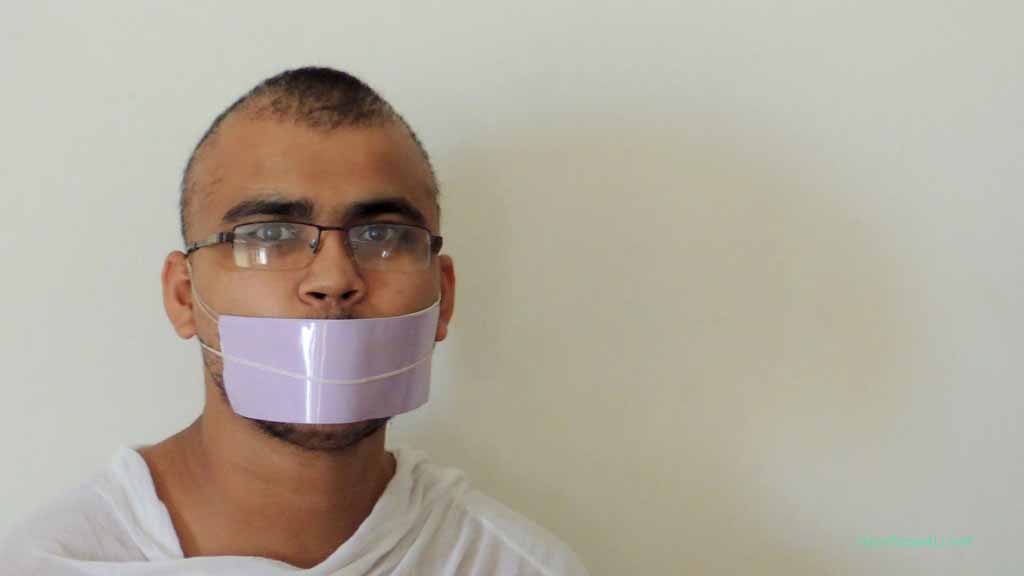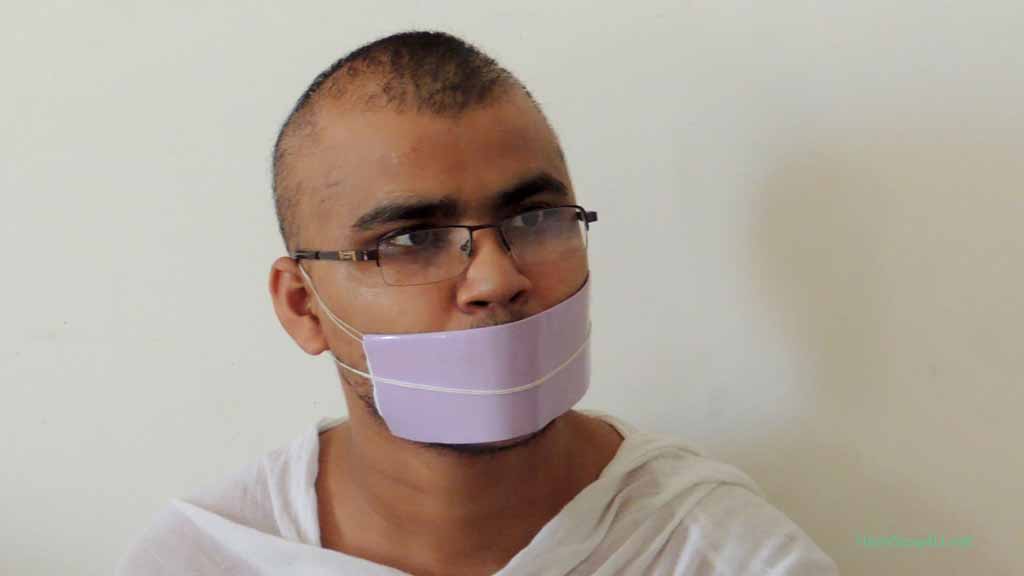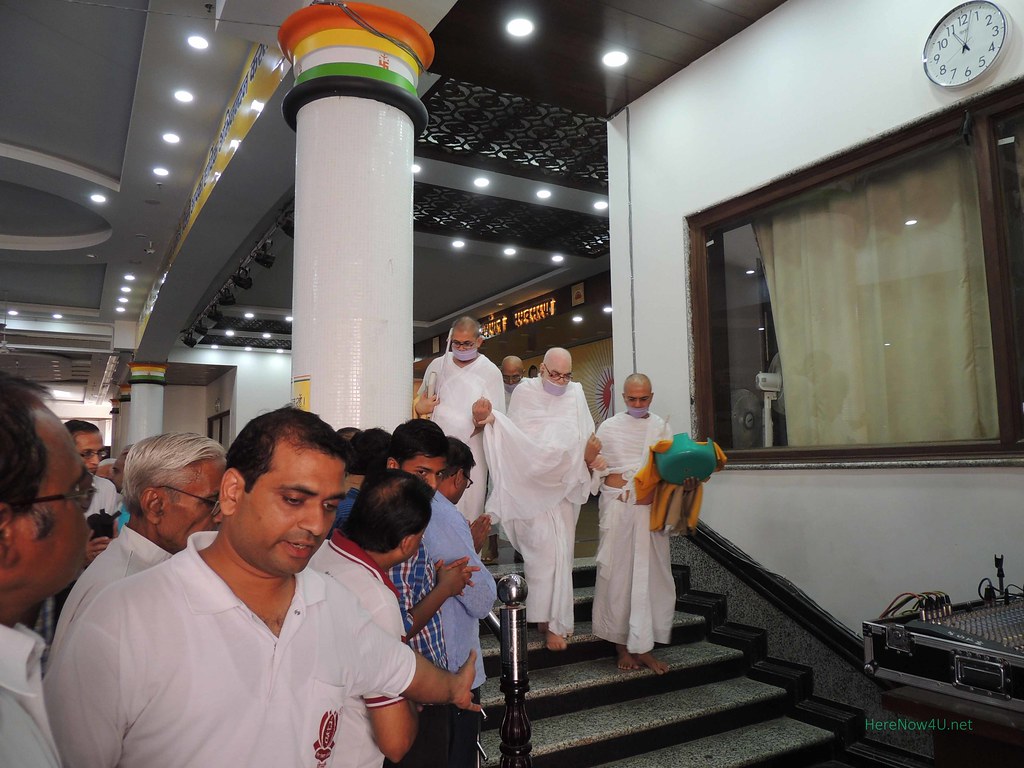
Muni Sumermal (Ladnun) (m) was about to leave the stage of the assembly hall, affectionately accompanied by two monks of his group, when we arrived this morning.
It was Muni Sumermal (Ladnun) who had delivered that morning’s lecture instead of HH Acharya Mahashraman. Sometimes HH confides this important task to Muni Sumermal (Ladnun) who had given Muni Diksha at the novice’s age of 11 to the present Acharya. Getting Muni Diksha by a monk acting instead of the Acharya also does not happen very often in Terapanth order. HH Acharya Mahashraman had left the previous afternoon for participation in an interfaith meeting of divers Indian religious traditions initiated by the Dalai Lama. As the morning lecture and other activities in this context are delivered in Hindi, which we are not able to follow, we arrived mostly when it was over.
The hour after the morning lecture and before lunch is convenient for short visits to the monks or to fix appointments with them for longer discussions. At this time only those two members of the monk groups are absent who are responsible for Gochari whereas the other monks are available for talks if not occupied with other activities. This morning we wanted to go to Muni Kishan Lal and to Muni Mahendra Kumar. The latter had given this time as convenient for a short discussion with him.
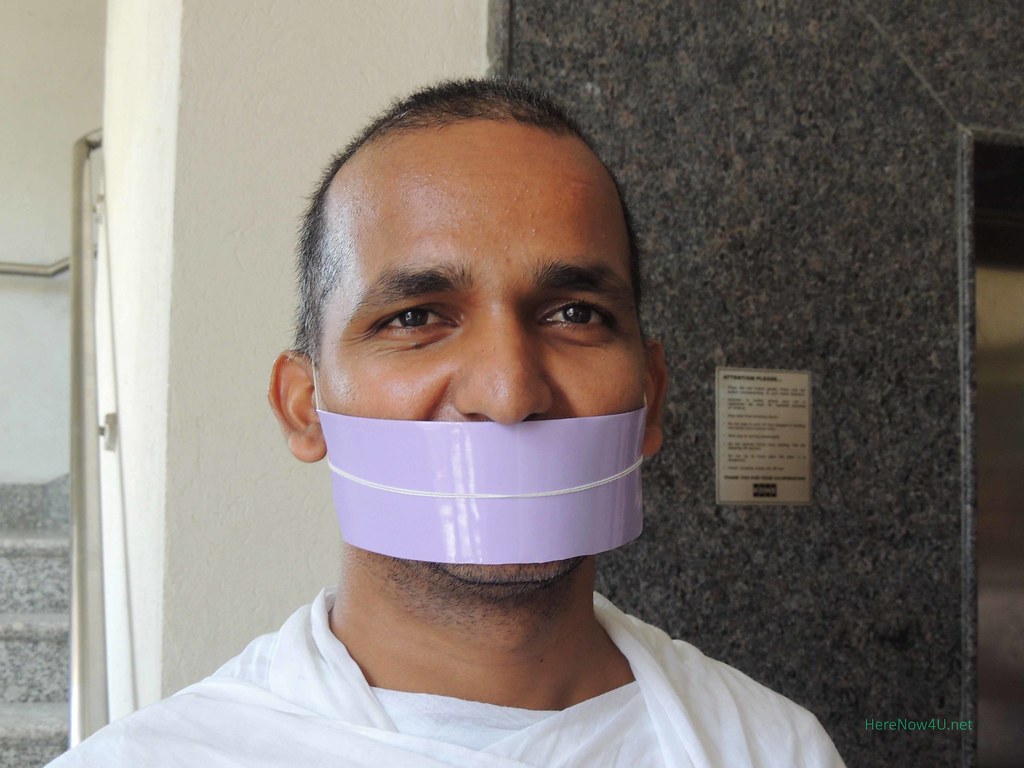
On the way we met Muni Jayant Kumar, familiar to us since quite some years.
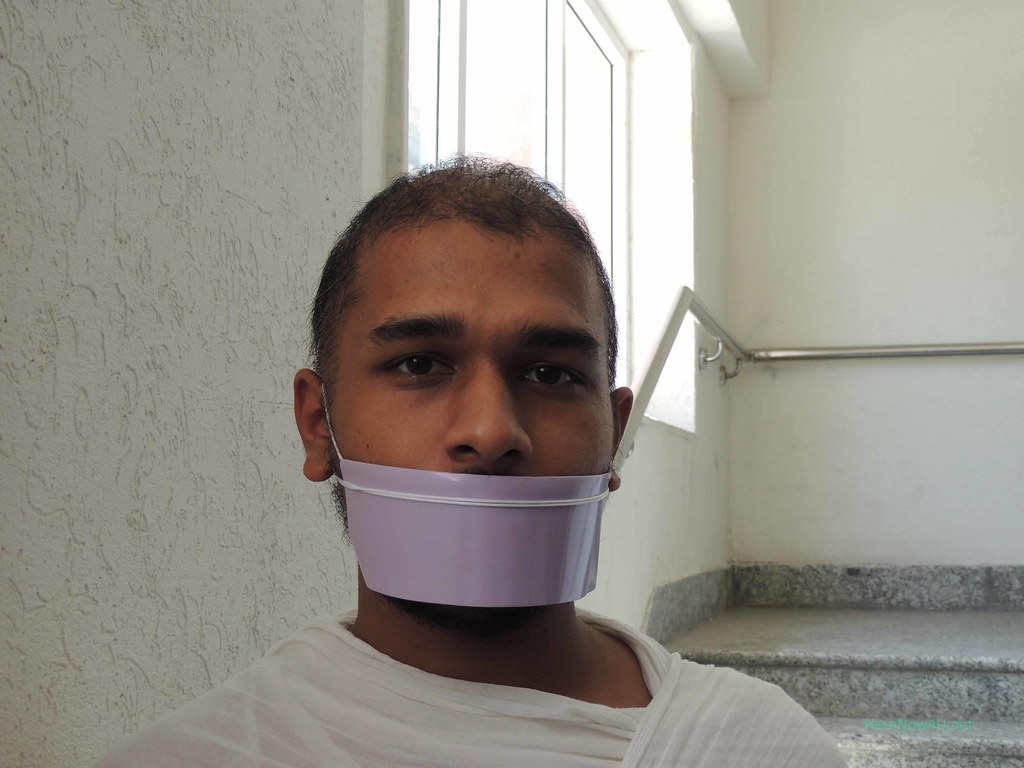
It was our first encounter with Muni Nay Kumar.
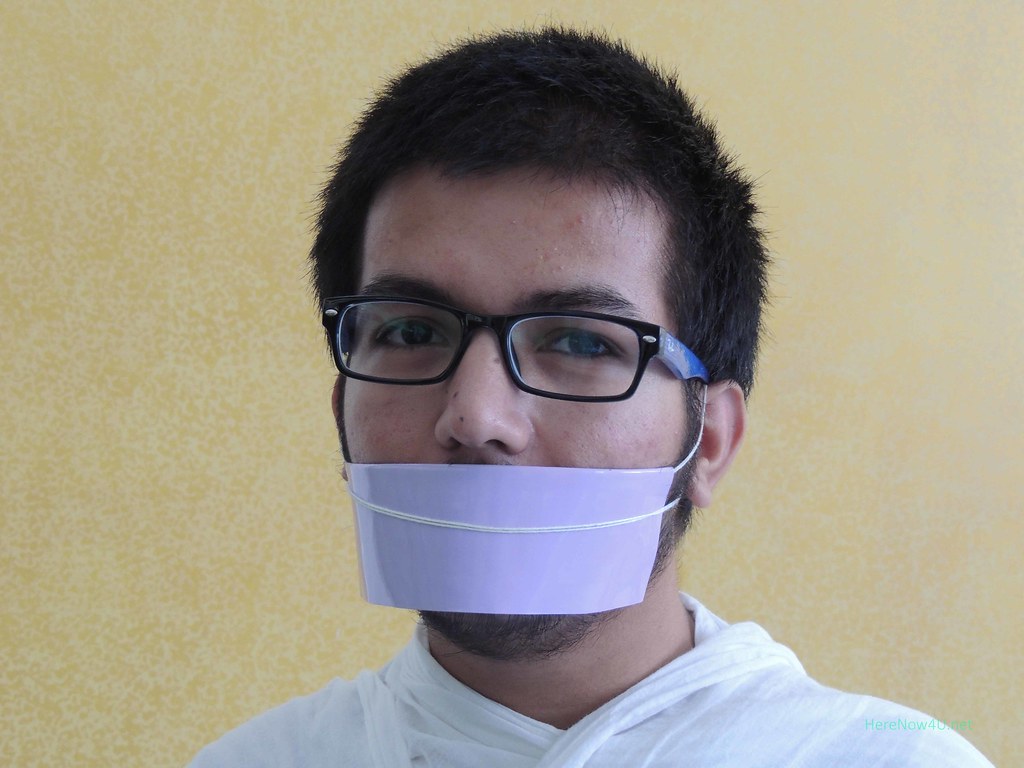
Same with Muni Sudhansu Kumar.
Again and again kindness and open-mindedness of the Munis is impressing, which they are voluntarily showering on people hitherto unknown to them. To people already known to them they generously are gifting their heaven like cheeriness. Muni Jayant Kumar was laughing when I was rather upset after he told me his name and I suddenly became aware that we know each other since quite some time, but I did not recognise him. Munis also are changing with the years, not only in length of hair and beard, but also in their faces. They all have in common to treat everyone as friend, while the clear message is emanating from them to be nobody’s enemy. Even when in the course of time they are in more and more delicate health condition, they never lose this aura of serenity full of understanding for all human concerns. Independent of their age, all of them have this attitude towards the world they have renounced rather often in a very young age. Renunciation as a positive turn to an individual way of life in a group of like-minded, not for demarcation, but for compassionate companionship towards all facets of life. Not only for this reason is it enriching to meet them again after some time. They very practically are showing on their faces, in their eyes the forming power of the life chosen, to be an individual totally abstaining from violence and power plays, although capability and talents might once have been there like in all of us. There is no cultivation of weakness in front of the world’s challenges, but the courage and the strength to turn the back to it and find the own human way in the truth of life.
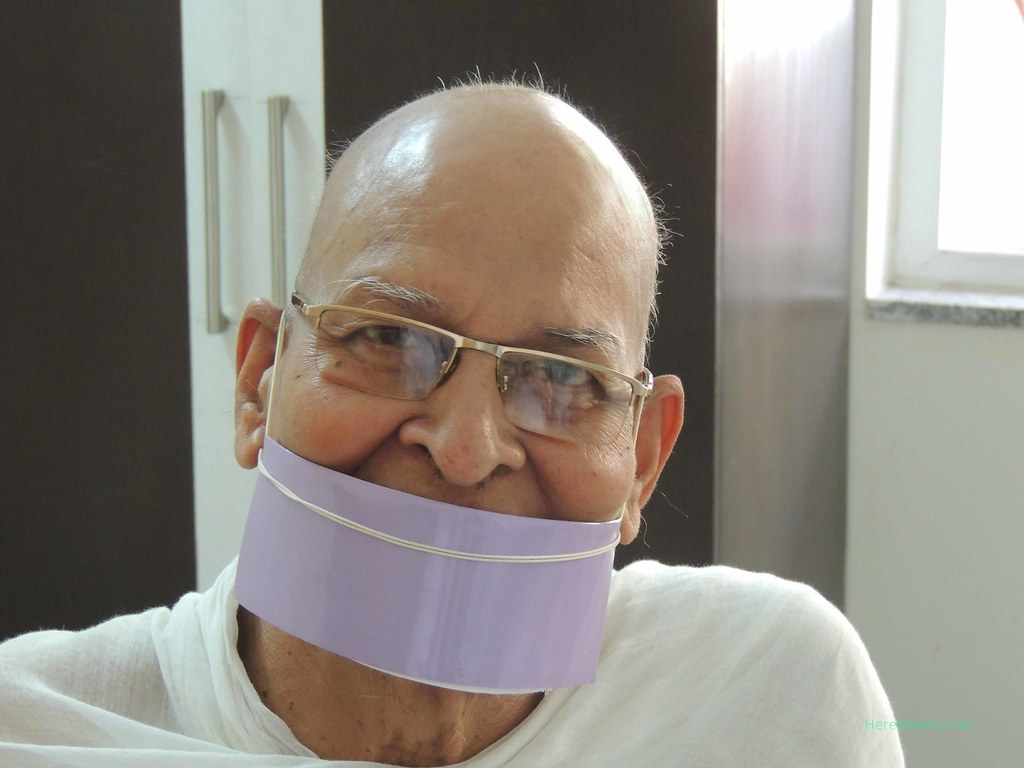
Muni Kishan Lal enjoyed our visit.
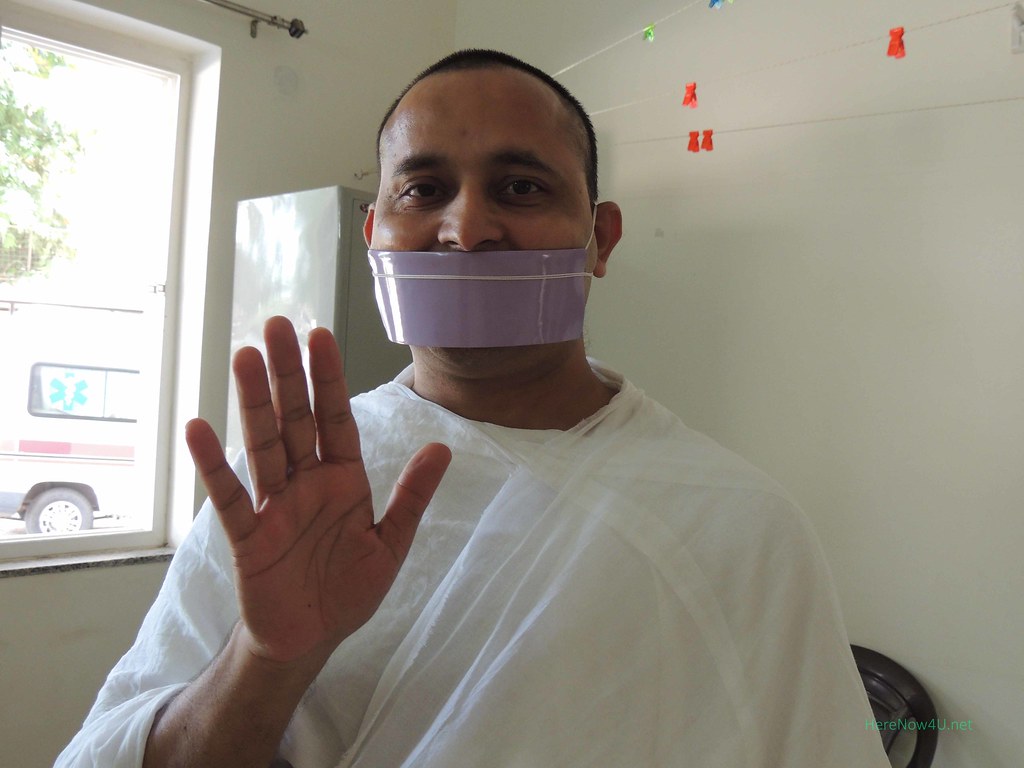
So did Muni Neeraj Kumar.
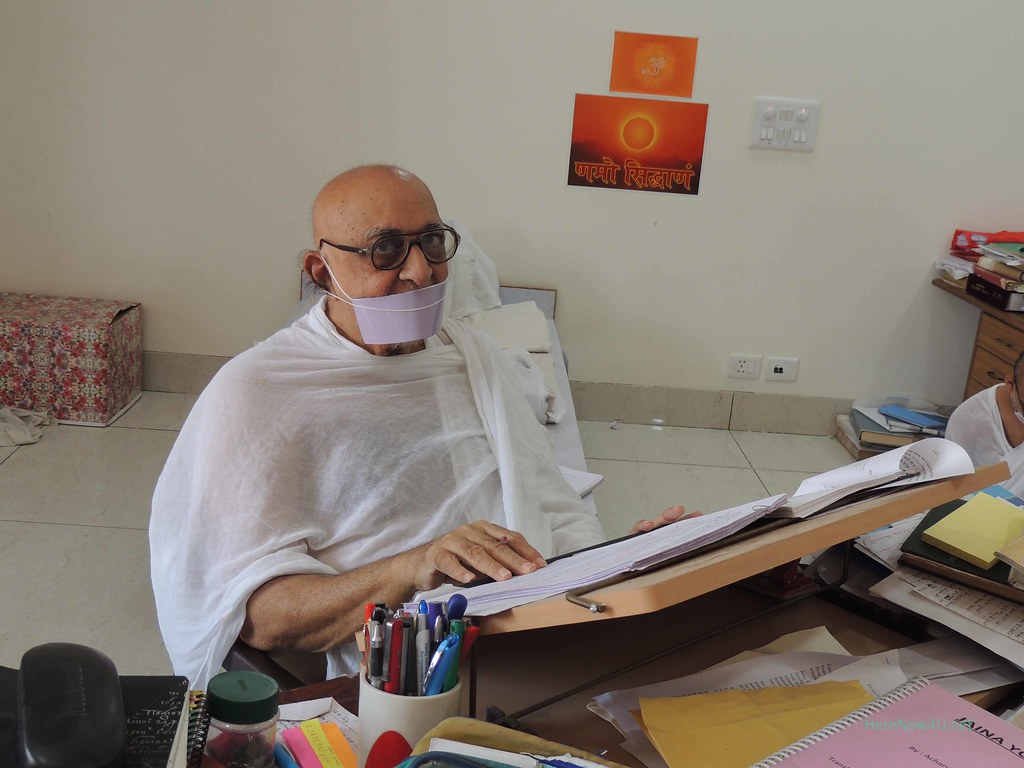
Muni Mahendra Kumar was very busy, as always.
Muni Mahendra Kumar took the time to talk with us. Since many years he had worked on the Hindi translation of Acaranga Sutra of Agamas from original Prakrit. Since in 2014 volume 5 had been completed, he immediately had started with the English translation, as he already had rendered the Hindi version into contemporary language from its sometimes difficult to understand Prakrit original. With this he realised the request of Acharya Mahashraman to continue the project started by Acharya Tulsi about 50 years ago to make accessible the knowledge of Jain philosophy in a language contemporary scholars and philosophers are able to comprehend. Further research subject of Muni Mahendra Kumar is how to integrate meditation into daily life. There are plans to create an institute for holistic health in JVBU Ladnun where Muni Mahendra Kumar since many years holds among others the chair of the Preksha Meditation department. Under his guidance scientifically evaluated research studies are intended to prove the effectivity of Preksha Meditation in the context of health protection and care. The research data will be published and discussed in the Internet to make them easily available for those parties involved, especially care-takers of senior people, students, and teachers of school children. He gave 3 aspects to consider when the question arises how their steps into life can be made easier for young people:
- Guidance how to use the time given to lead a meaningful and fulfilled life.
- Bringing subjects near to them in a logic and rational way with explanations.
- To live oneself accordingly.
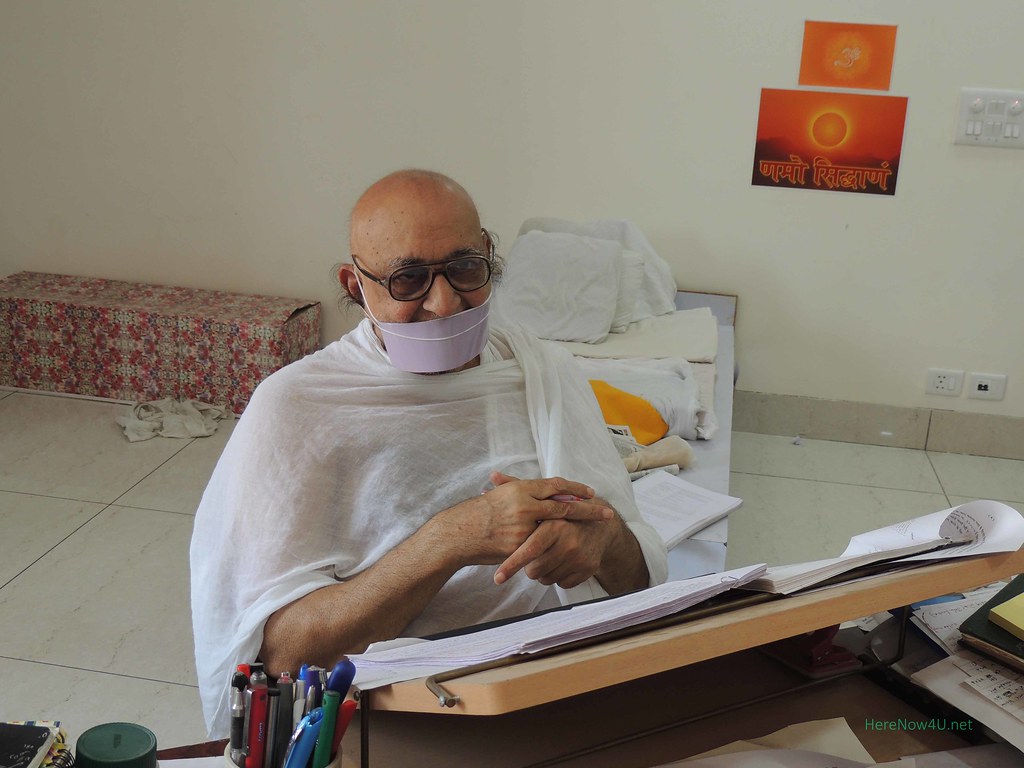
During our talk Muni Mahendra Kumar interrupted his work.
But there is more, Muni Mahendra Kumar is the doctoral thesis supervisor of Muni Abhijit Kumar’s research on “Doctrine of Gods in Jainism - A critical Study” on which he focused our attention. Muni Abhijit Kumar is in Muni Mahendra Kumar’s group, which means that supervisor and researcher have taken the same decision in a young age what kind of life they want to live. Muni Mahendra Kumar advised us to speak with Muni Abhijit Kumar himself what we promised. Already in 1991 Muni Mahendra Kumar had described the so-called protean body, e.g. used by the gods, in his book co-authored with his in worldly terms father “Microcosmology: Atom In Jain Philosophy & Modern Science” [2.4.6] Atom In Jain Philosophy - Pudgala Classification - (E) Five and or Eight Types, Vaikriya Vargana: books online. Since then he had discovered more details in the scriptures on protean body, which is characterised by changing easily and fast at will or by emotions. Muni Mahendra Kumar quoted Jain teachings on classification of physical matter saying that celestial and hellish beings are able to materialise themselves this way. Muni Mahendra Kumar explained further that protean body does neither allow the spiritual practice of self-restraint or self-control, nor the taking of vows being necessary to fulfill completely the spiritual insights of an individual. This can only be realised with a permanent body like ours with nervous systems, flesh, bones, etc. he added. We thanked and said good-bye to Muni Mahendra Kumar after these stimulating remarks, not without making appointment with Muni Abhijit Kumar for the afternoon.
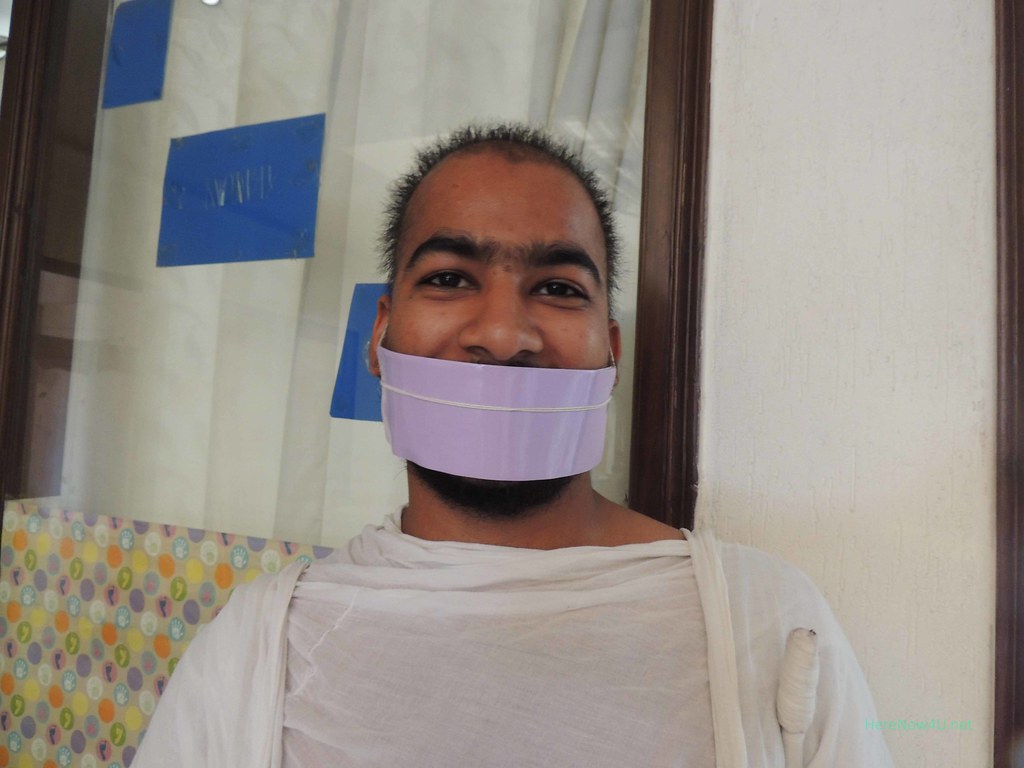
Muni Akash Kumar
On our way to Sushil Bafana who also was invited to have lunch at the Parakh family’s interim home we met Muni Akash Kumar who was initiated into monkhood 11 years ago in Surat, Gujarat, at the age of 13. This was the first Diksha I had witnessed, and it had impressed me a lot how the young Muni in about 10 minutes changed from an individual to an individual who is a Muni.
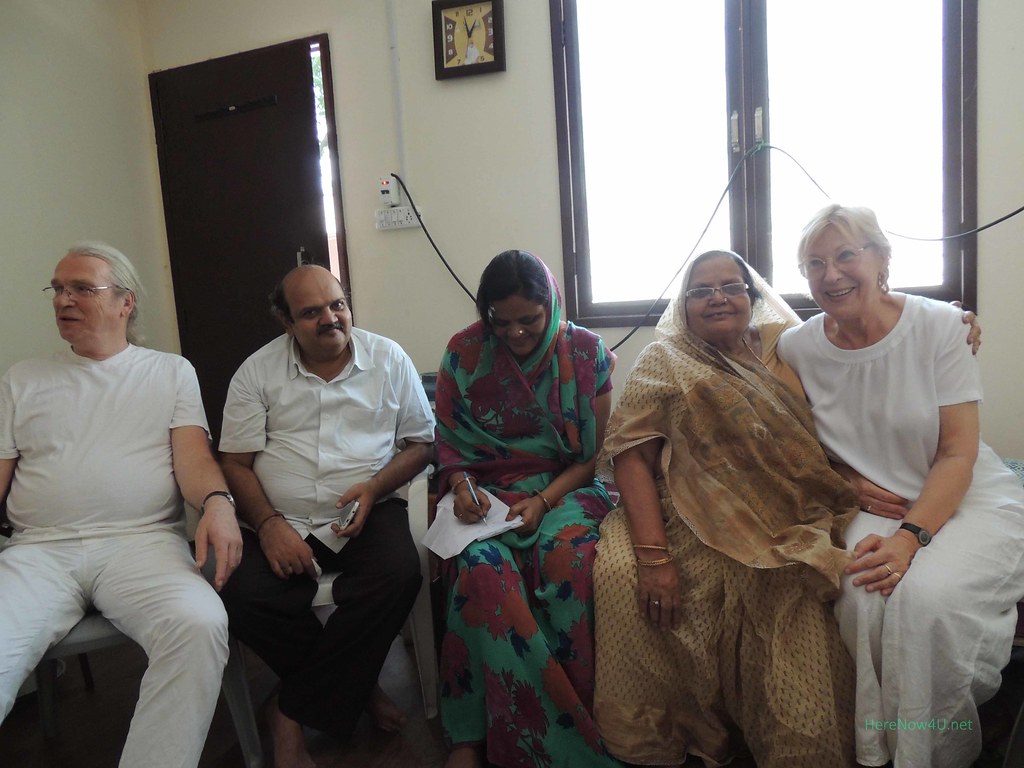
Christian Geerdes, Ashok Parakh, Sajjan Parakh, Rewanti Devi Parakh, Carla Geerdes
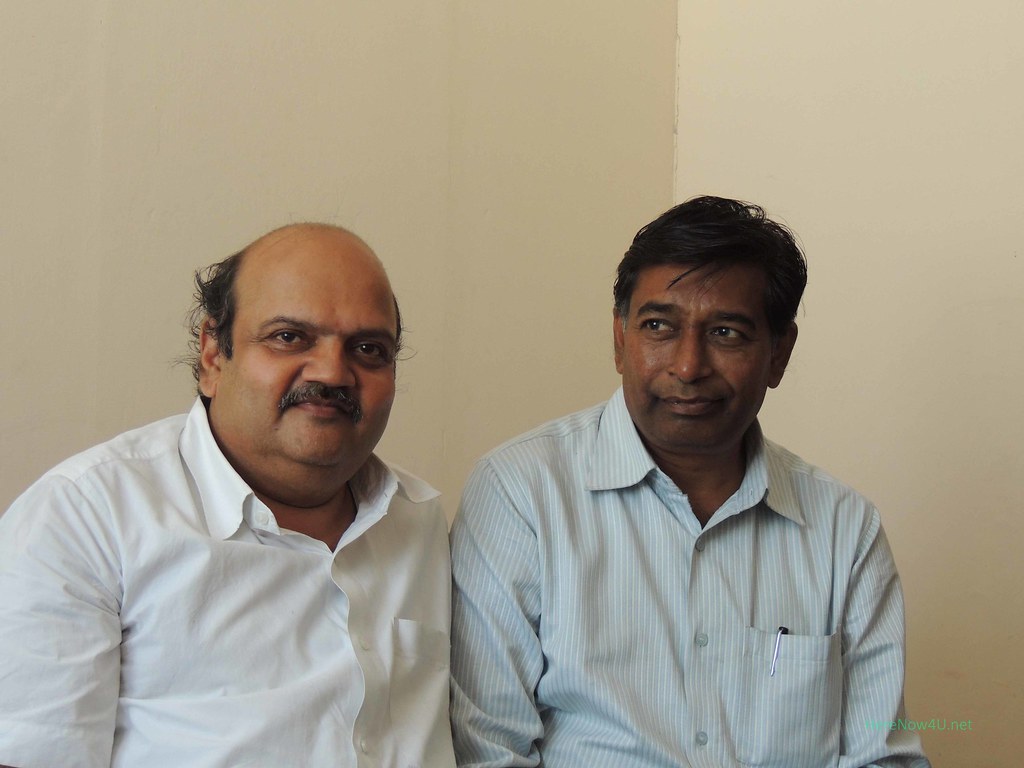
Friends from Sri Dungargarh: Ashok Parakh (l), Sushil Bafana.
We could have talked much longer, but it was time to go for lunch. The Parakh family originates from Sri Dungargarh, Rajasthan, hometown of Sushil Bafana as well. Ashok Parakh is like Sushil Bafana an Anuvrati. Both of them are certified members of Anuvrat Movement and in a licensed ceremony have accepted the Anuvratas as ethical code of conduct. Some years ago the Parakh family has moved from Sri Dungargarh to Siliguri for livelihood reasons. Siliguri has 650.000 inhabitants and is the biggest city in the Indian district of Darjeeling. At present they are proprietors of a well-selling small family company. During Delhi Chaturmas of HH Acharya Mahashraman Ashok and his wife Sajjan had requested the family counsel to set them free from their duties and to overtake their tasks towards the company and the family household. Together with the other family members the grown up children of Ashok and Sajjan are during their absence taking care of all. Naturally Ashok had asked his mother Rewanti Devi to accompany them to Delhi. No problem in a joint family how it rather often still is practiced in smaller towns or rural communities among Jain families.
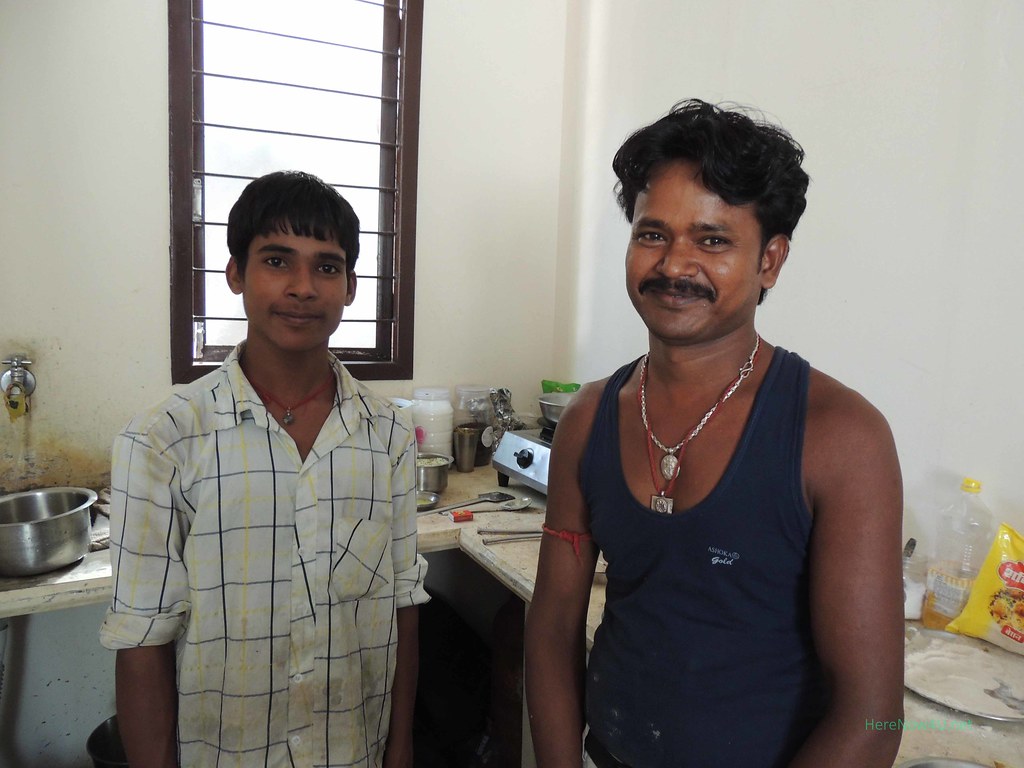
Ropan (l) and Dwamu, both born in Siliguri, are the cooks of the Parakh family.
Ropan and Dwamu had been on the train from Siliguri to Delhi for 2 days and a half. They reached Delhi some days in advance of the family’s arrival at the airport. They were entrusted with the task to prepare kitchen and accommodation for all the 5 of them. The cooks brought some non-perishables from Siliguri and purchased fresh items from a Delhi market recommended by the family. The money to pay for food and accommodation had been given to them by their employers. During their stay in Delhi they all lived in an interim lodge on the ASK campus. Those temporary cottages have cooking facilities and sometimes even running water, as it was the case here. They are erected especially for Chaturmas pilgrims, and torn down after the saints’ departure. Ropan and Dwamu had pleased smiles on their faces when we told them that there are good reasons for the family to have confidence in them. Not only because the lunch prepared by them was delicious. For us this invitation was like diving into a past sunken world. Perhaps long time ago life in India was likewise, when one was following one’s saints and living near to them for a certain period of time. Anyway, we were happy having witnessed a part of the Parakh family’s life during Delhi Chaturmas of HH Acharya Mahashraman.
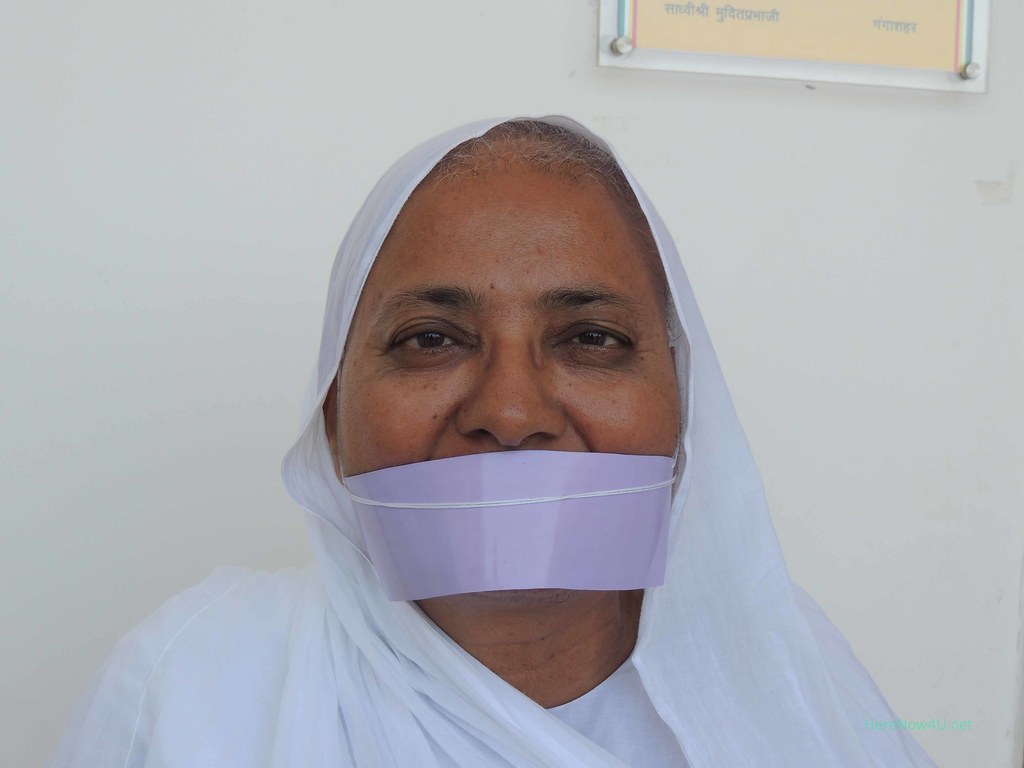
Inspired by Sushil Bafana we paid respect to Sadhvi Nirvan Shree.
Sadhvi Nirvan Shree also originates from Sri Dungargarh. Obviously the coherence among Rajasthani Jain families is rather strong when coming from the same place. We also knew Sadhvi Nirvan Shree from our visit to Sushil Bafana in Kolkata 8 years ago. Sadhvi Nirvan Shree was operating for 10 years far from her Acharya in rural areas and got about a lot. The atmosphere between us was cheerful and we really enjoyed Sadhvi Nirvan Shree’s presence.
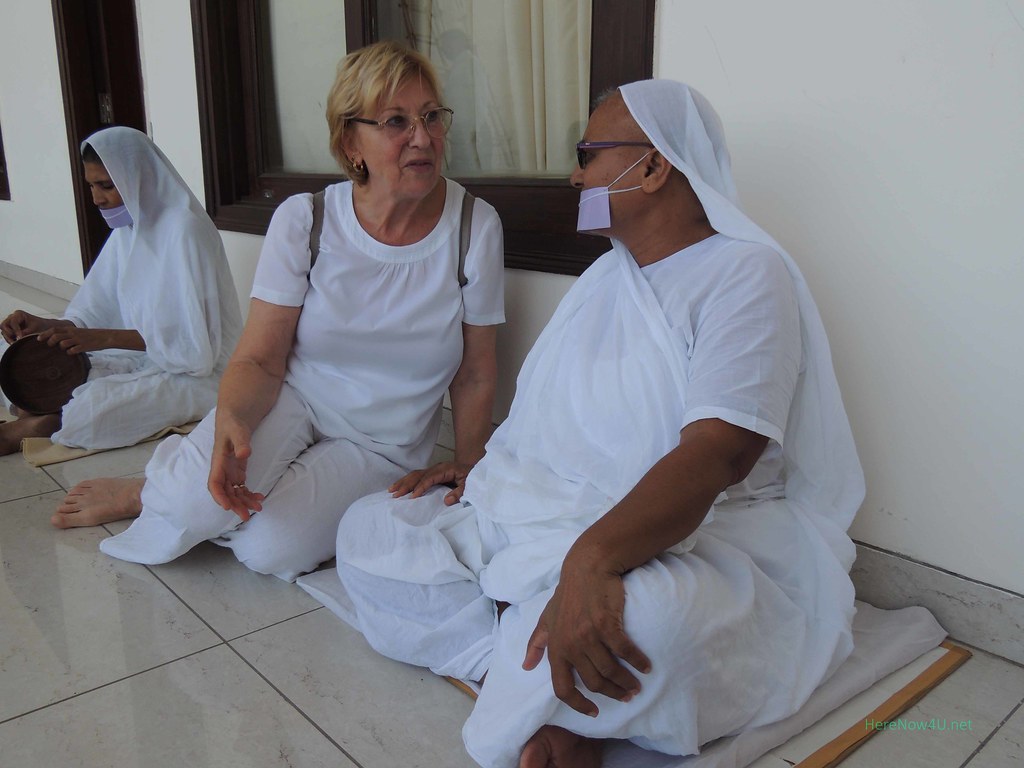
Carla Geerdes, Sadhvi Nirvan Shree
Sadhvi Nirvan Shree had walked about 10,000 km on the Indian subcontinent. During her ramblings she got to know countless families and gave guidance to them. Although she has renounced the world she knows very well about conflicts between people, and most important, its solution. Solution lies according to her experience in the readiness to change the own attitude and to look on the conflict with the eyes of the other person involved. She maintains the view that conflicts mainly are based in different mental approaches and can be solved only when moving mentally, away from oneself, and towards the other person. In this spirit she is showing their limitations to those seeking her advice and encourages them to overcome and jump over their own shadow. Most of the people feel activated by their own movement, which provides the energy to them to settle the quarrel, she explained.
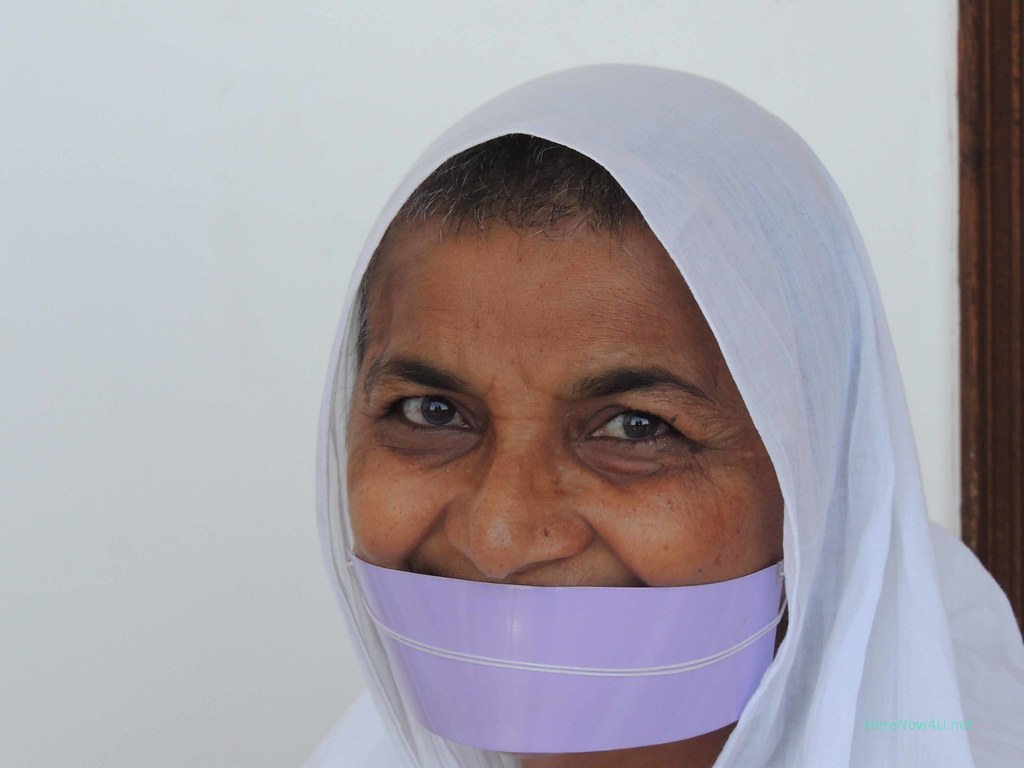
Sadhvi Yogkshem Prabha in the group of Sadhvi Nirvan Shree also is known to us since 8 years.
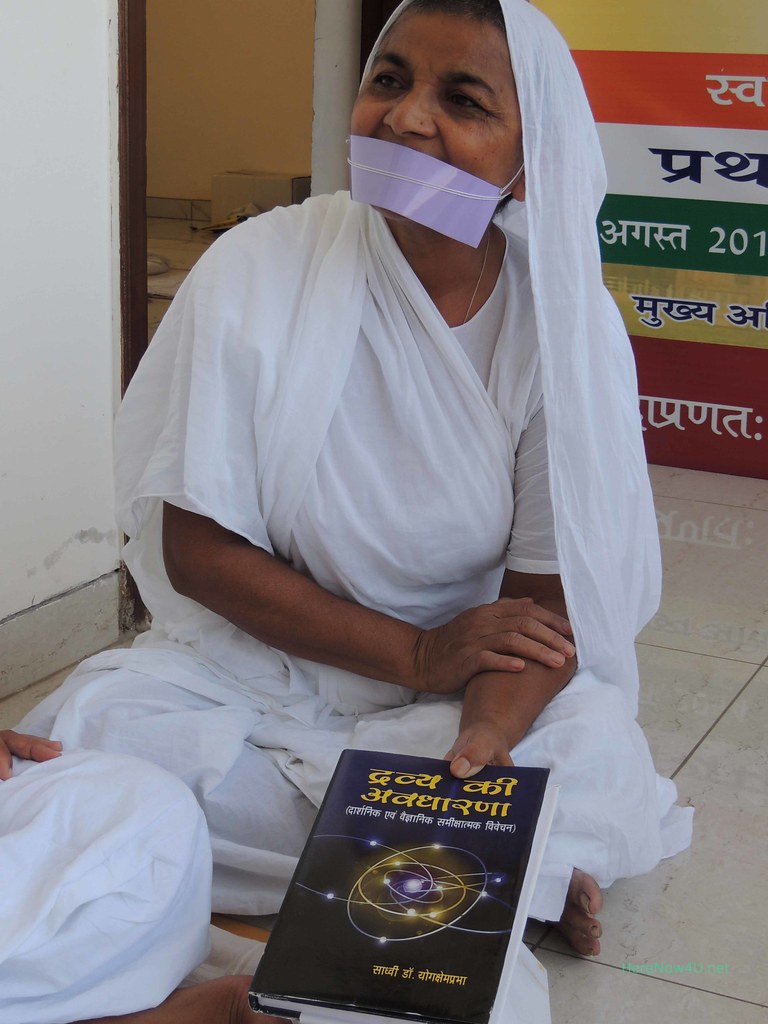
Sadhvi Yogkshem Prabha actually is working on the English translation of her Hindi book shown above. The English title is “Concept Of Reality“.
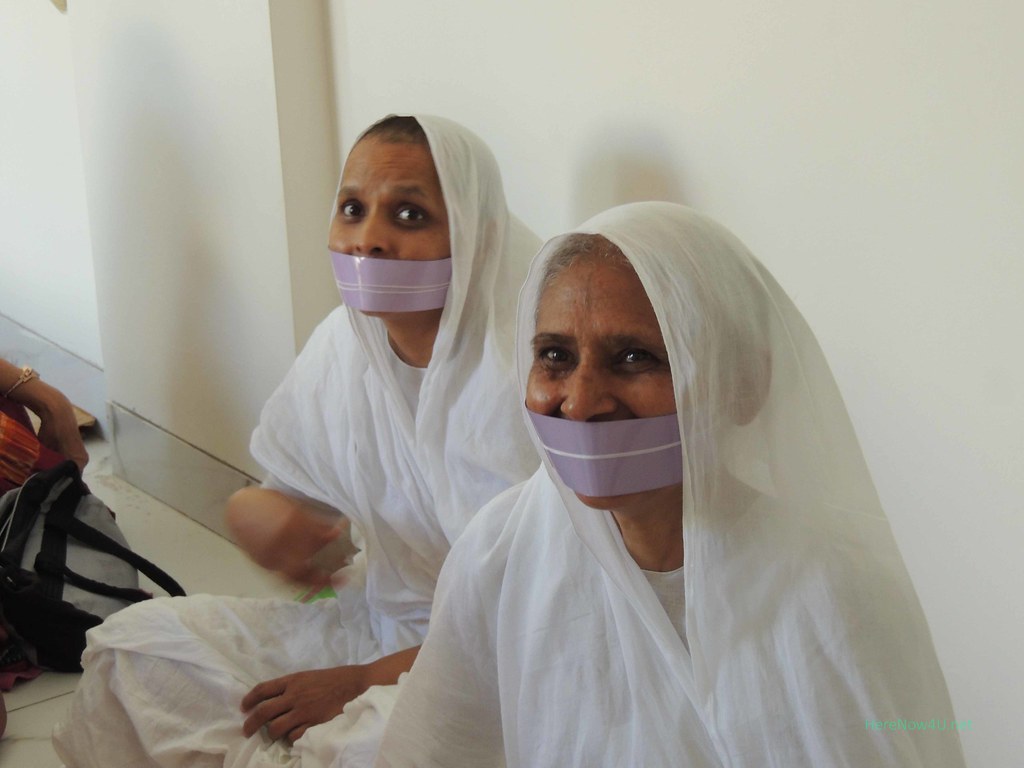
Sadhvi Shreshth Prabha (l) and Sadhvi Shantilata followed our talk with the two Sadhvis and were astonished when we asked them for their names.
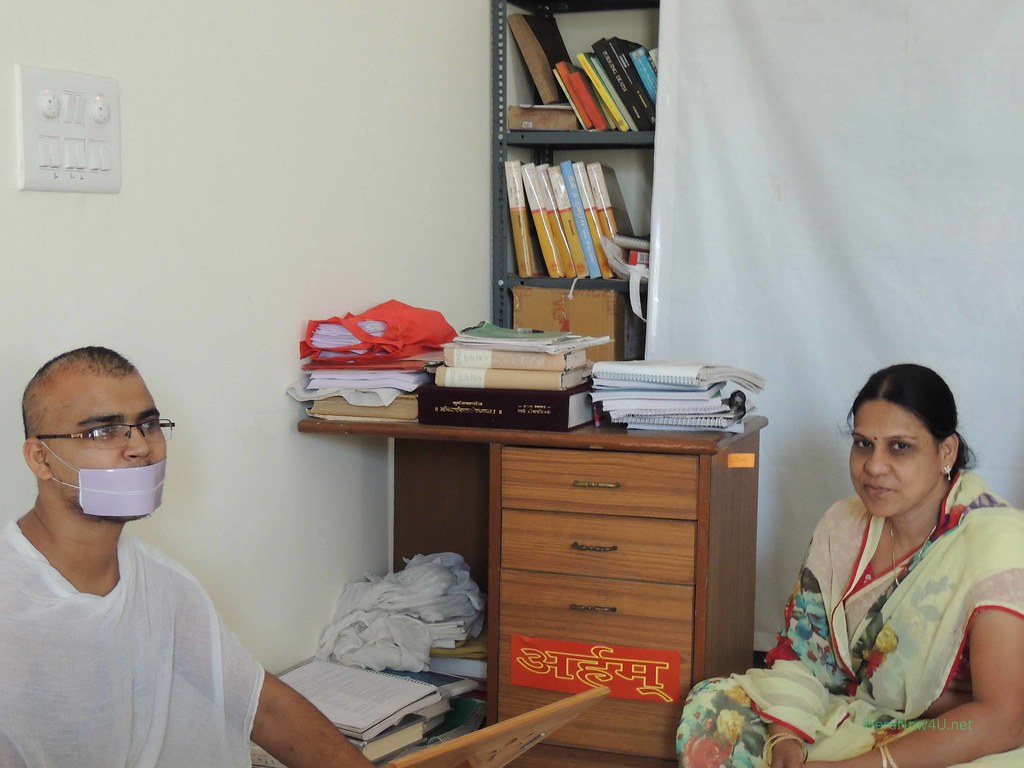
Muni Abhijit Kumar expected us, and was talking to a visitor, when we arrived.
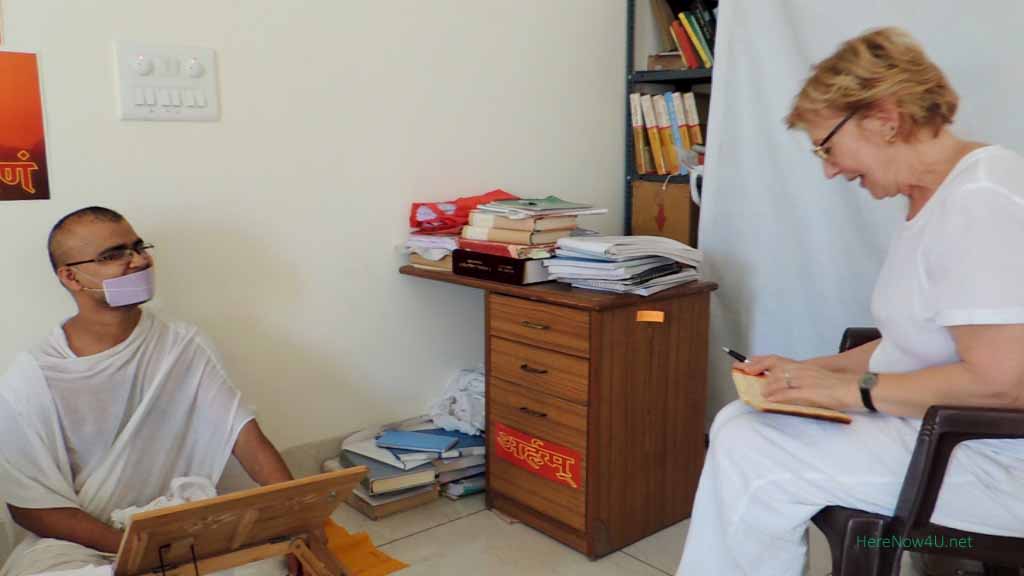
The lady took farewell immediately, as it was the scheduled time, she clarified smilingly.
When we asked him about his doctoral research study Muni Abhijit Kumar explained that there is a vast Jain literature on supernatural beings. Certain criteria are given there to recognise and classify them, he continued. According to Jain view, gods as well as demons are categorised as supernatural beings that because of their nature are differing about their view on the world and their attitude towards reality. Gods become what they are because of the good karma they have accumulated from positive emotions and actions in previous births. But even they are not able to free themselves from the circle of reincarnation and cannot attain Moksha. Muni Abhijit Kumar brought these informations in a ready-to-print way near to us.
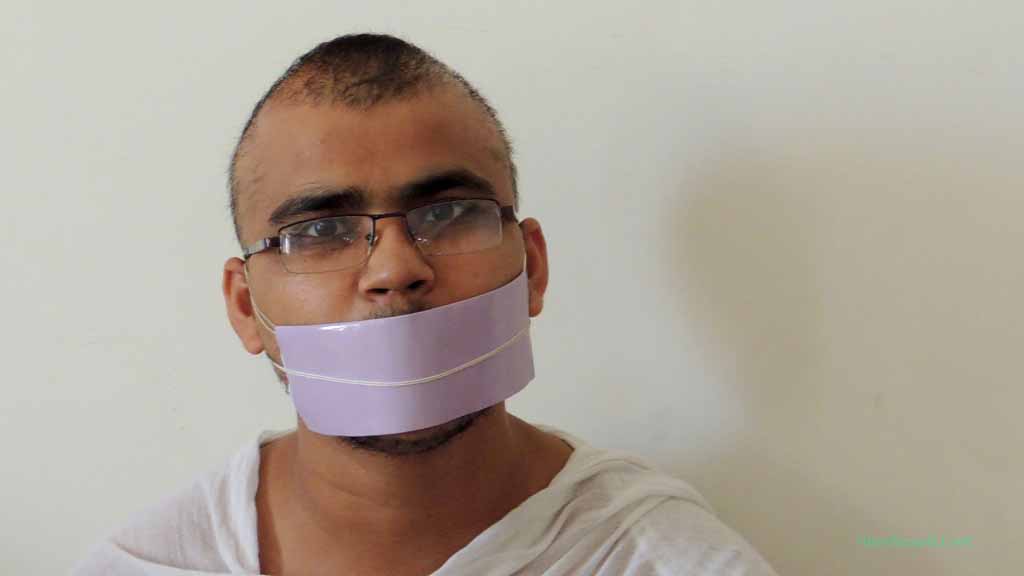
Muni Abhijit Kumar spoke on his research work.
Muni Abhijit Kumar is lucky to be in the group of Muni Mahendra Kumar who is most of the time at JVBU Ladnun where he holds a chair. When he is on his way, he has to have a rather well sorted library with him. That’s why he can provide in most cases immediately the necessary books for his doctoral candidate or refer to the university library in Ladnun where he is very well informed on the inventory. Further he is excellently connected with his research colleagues who also might be helpful for making available some especially useful books for his doctoral student. This saves a lot of time and energy to the latter. Meanwhile thanks to the support of experienced lay followers monks and nuns are able to ask for enquiry in the Internet and so indirectly can benefit from the many digital publications nowadays. Monks and nuns are not allowed to use computers or mobiles. All this is done for them by lay followers on their demand.
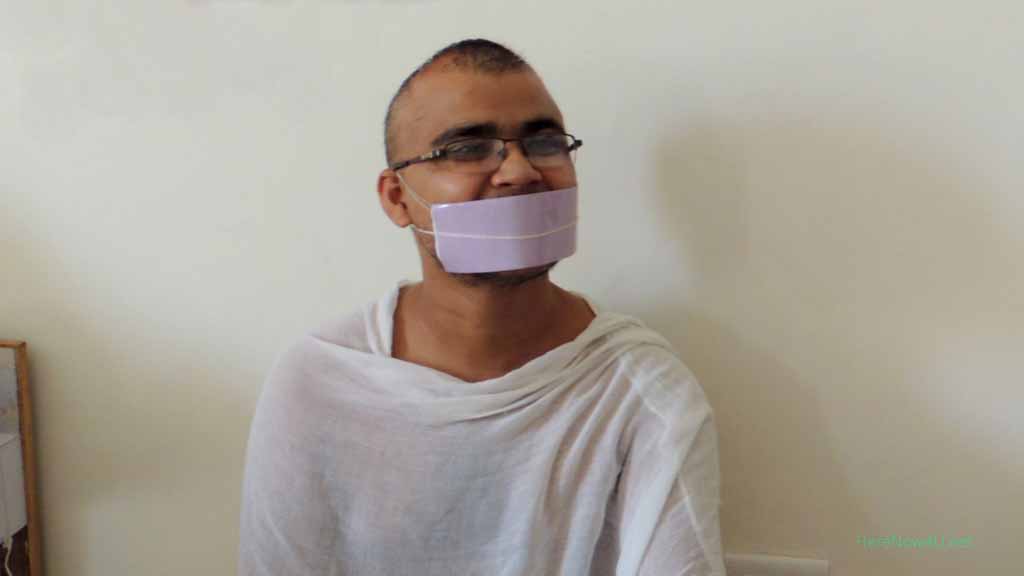
Muni Abhijit Kumar thinks it very convenient to address his supervisor whenever needed for exchanging thoughts.
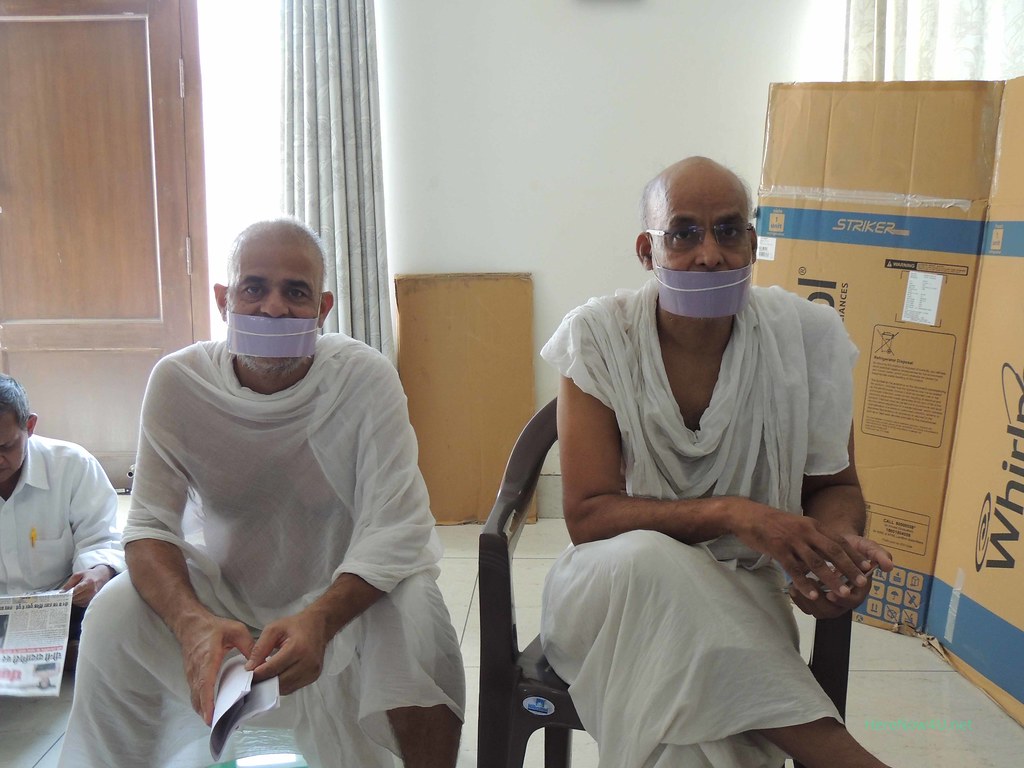
Muni Ajit Kumar (l) and Muni Amrit Kumar also are renowned scholars and in the group of Muni Mahendra Kumar.
It really is a rather unusual constellation here. The doctoral supervisor is a monk and so is the doctoral researcher. Both are sharing day-to-day life in a group of monks, work and eat together and sleep in the same room with the two other monks in the group. Their room does not have more space than that of other monk groups, but there has to be provided space for their desks and book shelves. There is no space for personal expansion. Nevertheless, there are no quarrels at all. This feels from the serene and cheerful atmosphere in the room and among the monks.
The whole day brought so many impressions and inspirations that we decided to withdraw for the rest of the day.
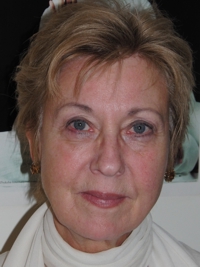 Editor Carla Geerdes
Editor Carla Geerdes
